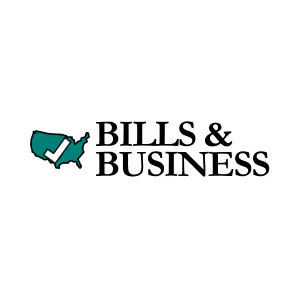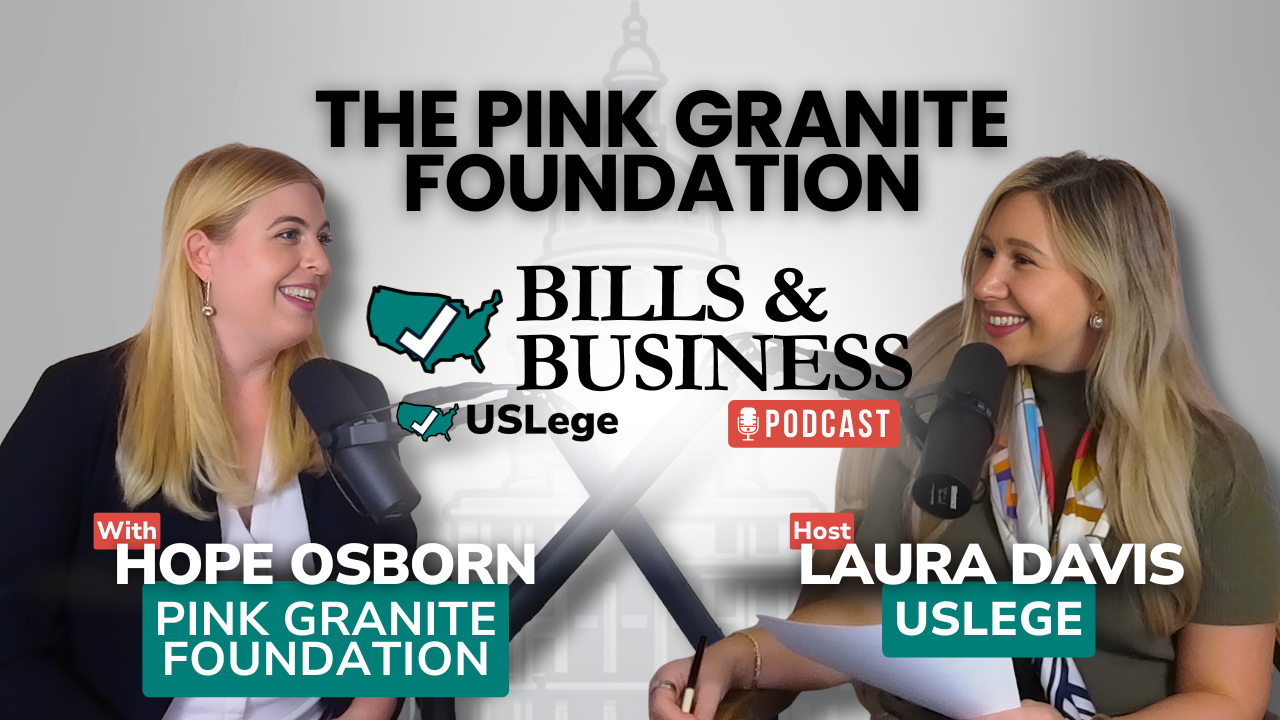
#44 - Hope Osborn: Building Community for Women in Texas Politics with Pink Granite
Welcome to Episode #44 of Bills & Business. In this episode, Laura Carr, Co-Founder of USLege, sits down with Hope Osborn, Co-Founder of The Pink Granite Foundation.
Hope brings more than a decade of experience across the Texas Capitol, having worked in both chambers, both parties, and in the advocacy world. She shares the story behind The Pink Granite Foundation and how it has grown into a nonpartisan force for uplifting, connecting, and supporting women in Texas politics. From its grassroots beginnings to the impact of the 2025 Pink Granite Party, Hope provides an inside look at how the organization strengthens the political ecosystem.
Laura and Hope explore the nonprofit’s mentorship programs, year-round community-building efforts, and the unique pressures women face working under the dome. Hope offers insight into why women’s leadership in politics matters, how to break down persistent barriers, and what the future looks like for the next generation of female leaders in Texas policymaking.
Don’t forget to subscribe to Bills & Business on Apple Podcasts, Spotify, and YouTube for more deep dives into Texas policy and business news.
📲 Follow Laura Carr
🐦 Twitter: @Laura_USLege https://x.com/Laura_USLege
💼 LinkedIn: https://www.linkedin.com/in/laurauslege/
📸 Instagram: https://www.instagram.com/thereallauracarr/
🛍️ ShopMy: https://shopmy.us/shop/lauraluise?Section_title=latest-finds&tab=collections
✍️ Substack: https://lauraluise.substack.com/
🔗 Links: https://lauraluise.carrd.co/
📲 Follow USLege
✨ Instagram: https://www.instagram.com/uslege.ai/
📘 Facebook: https://www.facebook.com/USLegeai
🐦 Twitter: @USLege_ai https://x.com/USLege_ai
💼 LinkedIn: https://www.linkedin.com/company/uslege-ai/
🎧 Subscribe to Bills & Business
🌐 Website: https://www.uslege.ai/
▶️ YouTube: https://www.youtube.com/@BillsandBusiness
🎵 Spotify: https://open.spotify.com/show/22ZWg9VVb2AEGqyV14osNi?si=effe3795f8414171
🍎 Apple Podcasts: https://podcasts.apple.com/ph/podcast/bills-and-business-by-uslege/id1781059329
🎥 TikTok: https://www.tiktok.com/@uslege
📲 Follow Hope Osborn
💼 LinkedIn: https://www.linkedin.com/in/hopeosborn/
🐦 Twitter: https://x.com/HopeOsbornTX
🎬 Produced by USLege
📞 Want to see USLege in action? Schedule a demo today! https://www.uslege.ai/demo
.avif)
#43 - Wes Benedict: Bridging Policy and Community with Texans for Reasonable Solutions
Welcome to Episode #43 of Bills & Business. In this episode, Laura Carr, Co-Founder of USLege, sits down with Wes Benedict, Grassroots Manager at Texans for Reasonable Solutions.
Wes brings years of advocacy experience and a steady, practical approach to community engagement. The conversation explores how Texas communities can navigate political tension, build cross-partisan coalitions, and create space for meaningful dialogue in an increasingly polarized environment.
They dive into the organization’s focus on key statewide issues including housing, infrastructure, water, and the evolving relationship between local and state governments. Wes breaks down why these policies matter for both everyday Texans and the business community, and how reasonable, bipartisan solutions can move conversations forward.
The episode closes with insights on how individuals can get involved, what success looks like in grassroots policy work, and what Texans should be watching as the special session unfolds.
Don’t forget to subscribe to Bills & Business on Apple Podcasts, Spotify, and YouTube for more deep dives into Texas policy and business news.
📲 Follow Laura Carr
🐦 Twitter: @Laura_USLege https://x.com/Laura_USLege
💼 LinkedIn: https://www.linkedin.com/in/laurauslege/
📸 Instagram: https://www.instagram.com/thereallauracarr/
🛍️ ShopMy: https://shopmy.us/shop/lauraluise?Section_title=latest-finds&tab=collections
✍️ Substack: https://lauraluise.substack.com/
🔗 Links: https://lauraluise.carrd.co/
📲 Follow USLege
✨ Instagram: https://www.instagram.com/uslege.ai/
📘 Facebook: https://www.facebook.com/USLegeai
🐦 Twitter: @USLege_ai https://x.com/USLege_ai
💼 LinkedIn: https://www.linkedin.com/company/uslege-ai/
🎧 Subscribe to Bills & Business
🌐 Website: https://www.uslege.ai/
▶️ YouTube: https://www.youtube.com/@BillsandBusiness
🎵 Spotify: https://open.spotify.com/show/22ZWg9VVb2AEGqyV14osNi?si=effe3795f8414171
🍎 Apple Podcasts: https://podcasts.apple.com/ph/podcast/bills-and-business-by-uslege/id1781059329
🎥 TikTok: https://www.tiktok.com/@uslege
📲 Follow Wes Benedict
🐦 Twitter: https://x.com/Wes_Benedict
💼 LinkedIn: https://www.linkedin.com/in/wes-benedict/
🎬 Produced by USLege
📞 Want to see USLege in action? Schedule a demo today! https://www.uslege.ai/demo
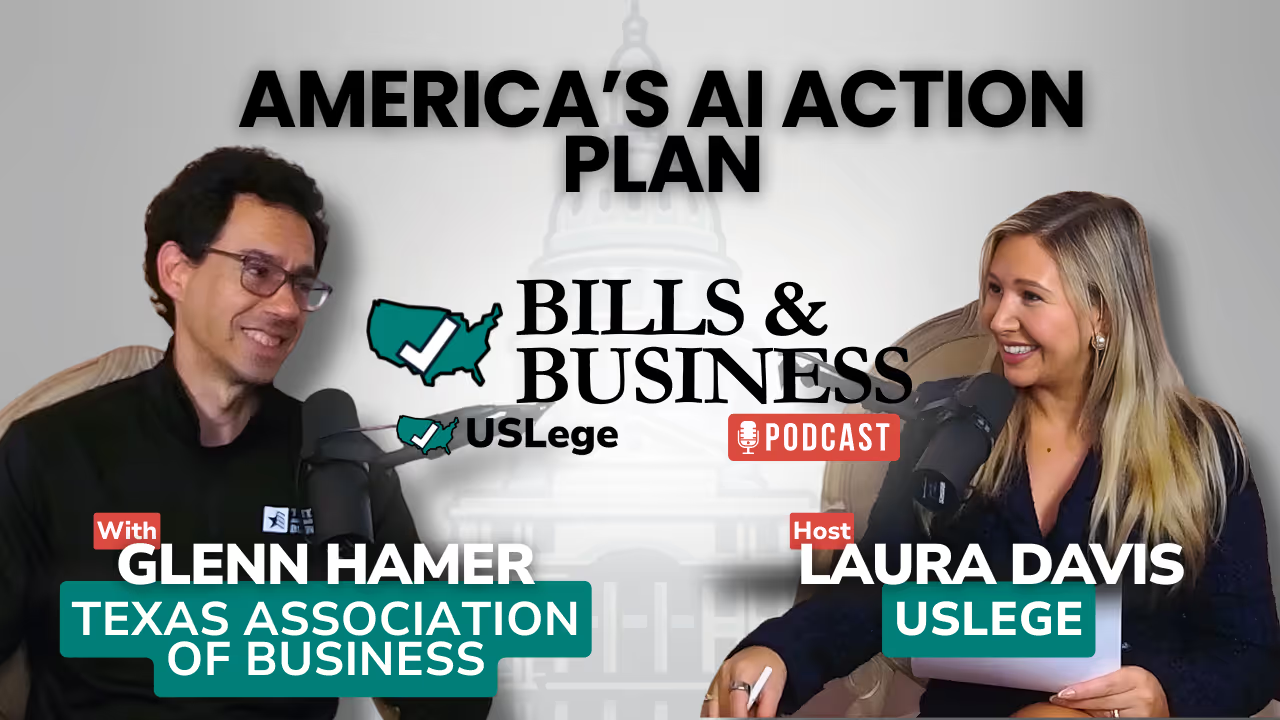
#42 - Glenn Hamer: America’s AI Action Plan
Welcome to Episode #42 of Bills & Business. In this episode, Laura Carr, Co-Founder of USLege, sits down with Glenn Hamer, President and CEO of the Texas Association of Business, to unpack the federal government’s new America’s AI Action Plan, a national strategy shaping the future of business, innovation, and competitiveness.
Glenn shares how this plan impacts Texas employers, entrepreneurs, and innovators, exploring its implications for AI infrastructure, workforce development, and global market positioning. Together, Laura and Glenn break down how policy decisions in Washington could fuel new opportunities in Texas’s energy, technology, and manufacturing sectors.
This conversation offers insight into the connection between federal AI policy and Texas’s business future, highlighting the state’s leadership potential in the next generation of innovation.
Don’t forget to subscribe to Bills & Business on Apple Podcasts, Spotify, and YouTube for more deep dives into Texas policy and business news.
📲 Follow Laura Carr
🐦 Twitter: @Laura_USLege
💼 LinkedIn: https://www.linkedin.com/in/laurauslege/
📸 Instagram: https://www.instagram.com/thereallauracarr/
🛍️ ShopMy: https://shopmy.us/shop/lauraluise?Section_title=latest-finds&tab=collections
✍️ Substack: https://lauraluise.substack.com/
🔗 Links: https://lauraluise.carrd.co/
📲 Follow USLege
✨ Instagram: https://www.instagram.com/uslege.ai/
📘 Facebook: https://www.facebook.com/USLegeai
🐦 Twitter: @USLege_ai
💼 LinkedIn: https://www.linkedin.com/company/uslege-ai/
🎧 Subscribe to Bills & Business
🌐 Website: https://www.uslege.ai/
▶️ YouTube: https://www.youtube.com/@BillsandBusiness
🎵 Spotify: https://open.spotify.com/show/22ZWg9VVb2AEGqyV14osNi?si=effe3795f8414171
🍎 Apple Podcasts: https://podcasts.apple.com/ph/podcast/bills-and-business-by-uslege/id1781059329
🎥 TikTok: https://www.tiktok.com/@uslege
📲 Follow Glenn Hamer
🐦 Twitter: @GlennHamer
💼 LinkedIn: https://www.linkedin.com/in/glennhamer/
🎬 Produced by USLege
📞 Want to see USLege in action? Schedule a demo today: https://www.uslege.ai/demo
#aipolicy #artificialintelligence #billsandbusiness #texasbusiness #uslege #txlege
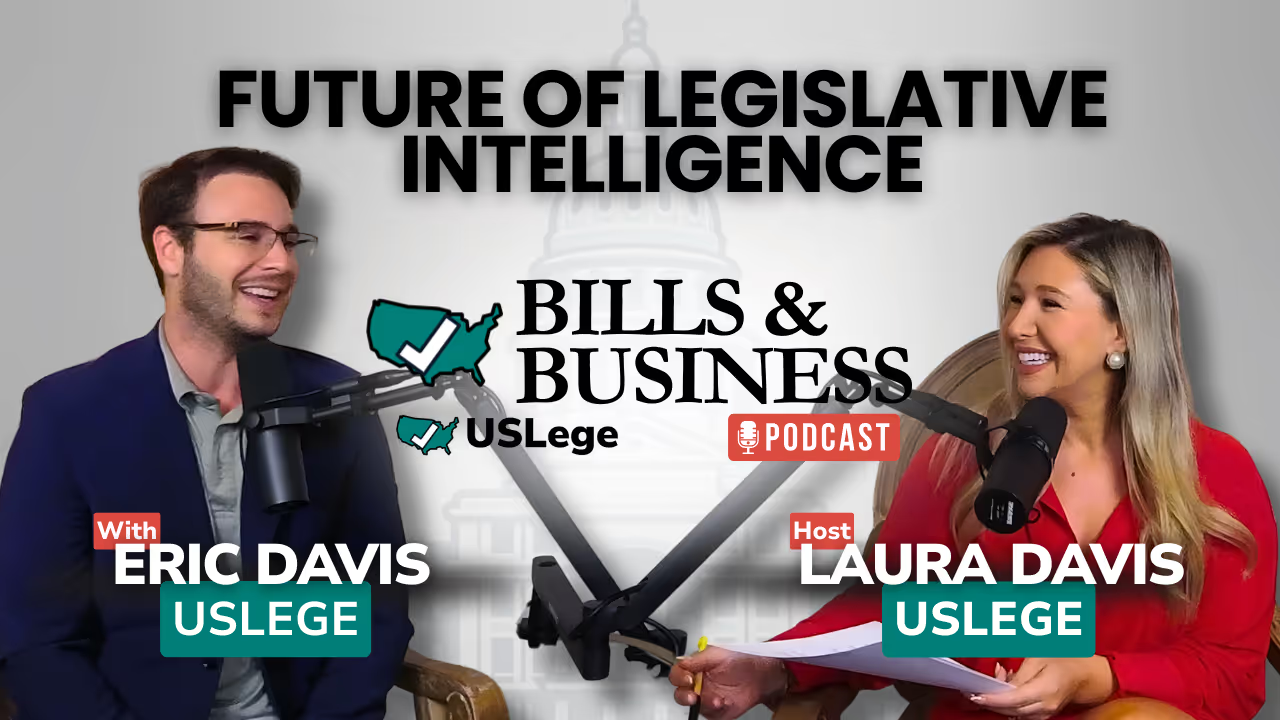
#41 - Eric Davis: The Future of Legislative Intelligence
Welcome to Episode #41 of Bills & Business. In this episode, Laura Carr, Co-Founder of USLege, sits down with Eric Davis, Co-Founder and CEO of USLege, for a behind-the-scenes look at how the company went from an idea in an Austin apartment to a fast-growing leader in legislative intelligence.
Eric shares the real story of building USLege from the ground up: the early bootstrapping days, customer research that validated the vision, and the turning points that led to securing investors like Reformation Ventures and Avalanche Ventures. Together, Laura and Eric discuss what it takes to build a Texas tech startup that is transforming how policy professionals work, communicate, and make impact.
They also dive into the next chapter for USLege, from AI-driven workflows to the future of legislative data and the evolving relationship between technology and government.
Don’t forget to subscribe to Bills & Business on Apple Podcasts, Spotify, and YouTube for more deep dives into Texas policy and business news.
📲 Follow Laura Carr
🐦 Twitter: @Laura_USLege https://x.com/Laura_USLege
💼 LinkedIn: https://www.linkedin.com/in/laurauslege/
📸 Instagram: https://www.instagram.com/thereallauracarr/
🛍️ ShopMy: https://shopmy.us/shop/lauraluise?Section_title=latest-finds&tab=collections
✍️ Substack: https://lauraluise.substack.com/
🔗 Links: https://lauraluise.carrd.co/
📲 Follow USLege
✨ Instagram: https://www.instagram.com/uslege.ai/
📘 Facebook: https://www.facebook.com/USLegeai
🐦 Twitter: @USLege_ai https://x.com/USLege_ai
💼 LinkedIn: https://www.linkedin.com/company/uslege-ai/
🎧 Subscribe to Bills & Business
🌐 Website: https://www.uslege.ai/
▶️ YouTube: https://www.youtube.com/@BillsandBusiness
🎵 Spotify: https://open.spotify.com/show/22ZWg9VVb2AEGqyV14osNi?si=effe3795f8414171
🍎 Apple Podcasts: https://podcasts.apple.com/ph/podcast/bills-and-business-by-uslege/id1781059329
🎥 TikTok: https://www.tiktok.com/@uslege
📲 Follow Eric Davis
💼 LinkedIn: https://www.linkedin.com/in/eric-in-tech/
🎬 Produced by USLege
📞 Want to see USLege in action? Schedule a demo today! https://www.uslege.ai/demo
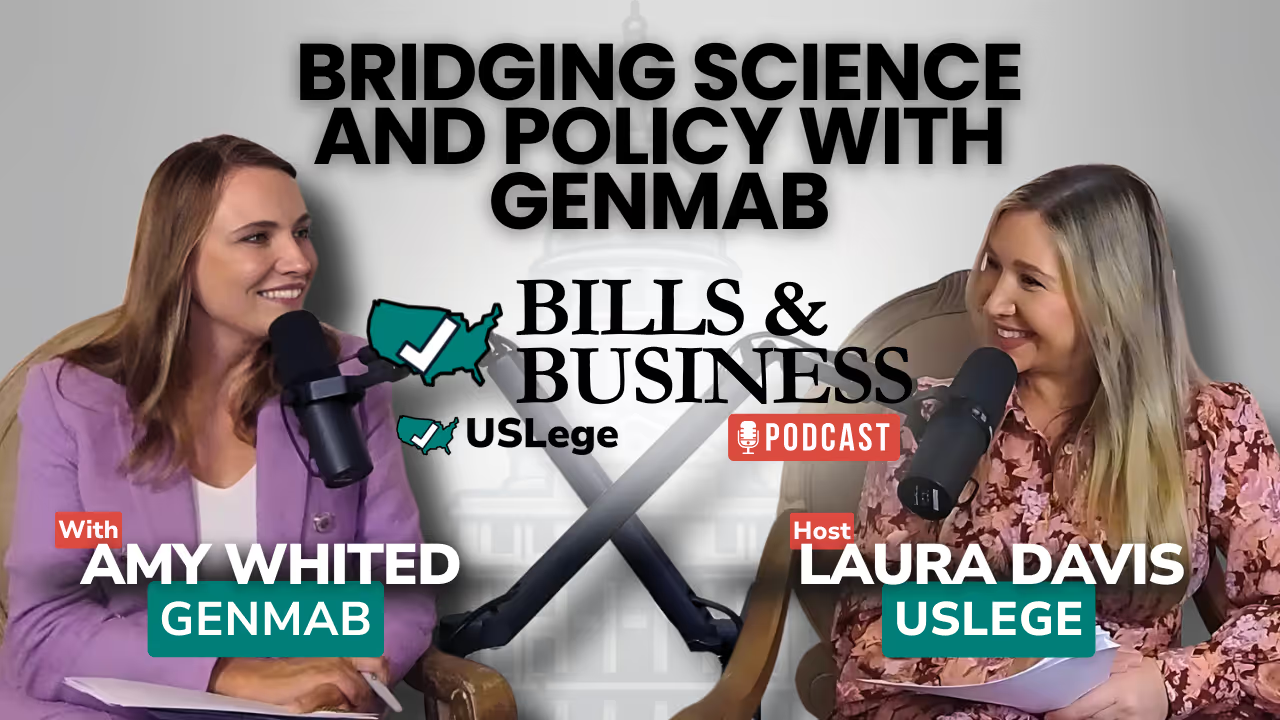
#40 - Amy Whited: Bridging Science and Policy with Genmab
Welcome to Episode #40 of Bills & Business. In this episode, Laura Carr, Co-Founder of USLege, sits down with Amy Whited, Regional Director of Government Affairs at Genmab, a global biotechnology company pioneering antibody-based therapeutics to fight cancer.
Amy’s story spans more than two decades in politics and advocacy, from campaign war rooms to the forefront of biotech innovation. She shares her journey from political strategist to corporate advocate, offering a unique lens into how science, policy, and patient outcomes intersect.
Together, Laura and Amy discuss how Genmab is advancing research in gynecologic cancers, addressing disparities in women’s health, and influencing public policy both in Texas and across the Western states. The conversation also explores the business side of health innovation. How advocacy can drive economic impact while shaping more humane and effective treatments.
Don’t forget to subscribe to Bills & Business on Apple Podcasts, Spotify, and YouTube for more deep dives into Texas policy and business news.
📲 Follow Laura Carr
🐦 Twitter: @Laura_USLege https://x.com/Laura_USLege
💼 LinkedIn: https://www.linkedin.com/in/laurauslege/
📸 Instagram: https://www.instagram.com/thereallauracarr/
🛍️ ShopMy: https://shopmy.us/shop/lauraluise?Section_title=latest-finds&tab=collections
✍️ Substack: https://lauraluise.substack.com/
🔗 Links: https://lauraluise.carrd.co/
📲 Follow USLege
✨ Instagram: https://www.instagram.com/uslege.ai/
📘 Facebook: https://www.facebook.com/USLegeai
🐦 Twitter: @USLege_ai https://x.com/USLege_ai
💼 LinkedIn: https://www.linkedin.com/company/uslege-ai/
🎧 Subscribe to Bills & Business
🌐 Website: https://www.uslege.ai/
▶️ YouTube: https://www.youtube.com/@BillsandBusiness
🎵 Spotify: https://open.spotify.com/show/22ZWg9VVb2AEGqyV14osNi?si=effe3795f8414171
🍎 Apple Podcasts: https://podcasts.apple.com/ph/podcast/bills-and-business-by-uslege/id1781059329
🎥 TikTok: https://www.tiktok.com/@billsandbusiness
📲 Follow Amy Whited
💼 LinkedIn: https://www.linkedin.com/in/amy-whited/
🐦 Twitter: https://x.com/amy_whited
🎬 Produced by USLege 📞 Want to see USLege in action? Schedule a demo today! https://www.uslege.ai/demo
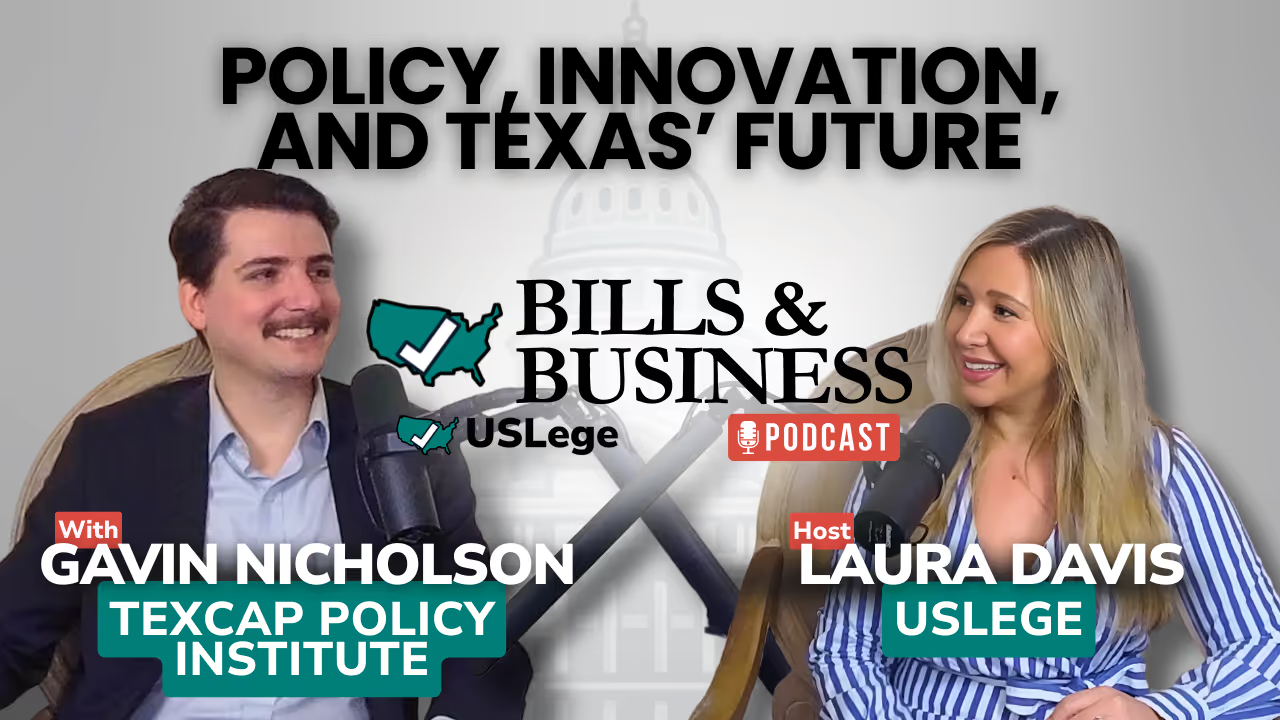
#39 - Gavin Nicholson: Policy, Innovation & Texas’ Future with TexCap Policy Institute
Welcome to Episode #39 of Bills & Business. In this episode, Laura Carr, Co-Founder of USLege, sits down with Gavin Nicholson, Founder and CEO of the TexCap Policy Institute, a nonpartisan think tank focused on channeling private capital into public good through innovation, infrastructure, and responsible governance.
Nicholson shares his journey from serving as Chief of Staff in the Texas Legislature to launching TexCap, explaining how lessons from the Capitol now shape his work. He reflects on building a nonpartisan think tank in a polarized climate, and how tools like USLege supported TexCap’s early growth.
The discussion dives into TexCap’s mission of leveraging private-sector investment for long-term prosperity in Texas. Nicholson breaks down opportunities in infrastructure, equitable tax structures, and bipartisan coalition-building, while spotlighting areas where Texas may be leaving value on the table.
Looking toward the future, Nicholson addresses how Texas should approach policy around AI, autonomous vehicles, geothermal energy, and emerging technologies like data centers. He emphasizes transparency, inclusion, and rural equity as guiding principles for sustainable innovation.
Don’t forget to subscribe to Bills & Business on Apple Podcasts, Spotify, and YouTube for more deep dives into Texas policy and business news.
📲 Follow Laura Carr
🐦 Twitter: @Laura_USLege https://x.com/Laura_USLege
💼 LinkedIn: https://www.linkedin.com/in/laurauslege/
📸 Instagram: https://www.instagram.com/thereallauracarr/
🛍️ ShopMy: https://shopmy.us/shop/lauraluise?Section_title=latest-finds&tab=collections
✍️ Substack: https://lauraluise.substack.com/
🔗 Links: https://lauraluise.carrd.co/
📲 Follow USLege
✨ Instagram: https://www.instagram.com/uslege.ai/
📘 Facebook: https://www.facebook.com/USLegeai
🐦 Twitter: @USLege_ai https://x.com/USLege_ai
💼 LinkedIn: https://www.linkedin.com/company/uslege-ai/
🎧 Subscribe to Bills & Business
🌐 Website: https://www.uslege.ai/
▶️ YouTube: https://www.youtube.com/@BillsandBusiness
🎵 Spotify: https://open.spotify.com/show/22ZWg9VVb2AEGqyV14osNi?si=effe3795f8414171
🍎 Apple Podcasts: https://podcasts.apple.com/ph/podcast/bills-and-business-by-uslege/id1781059329
🎥 TikTok: https://www.tiktok.com/@billsandbusiness
📲 Follow Gavin Nicholson
🐦 Twitter: https://x.com/gavinrnicholson
💼 LinkedIn: https://www.linkedin.com/in/gavinnicholson97/
🎬 Produced by USLege
📞 Want to see USLege in action? Schedule a demo today! https://www.uslege.ai/demo
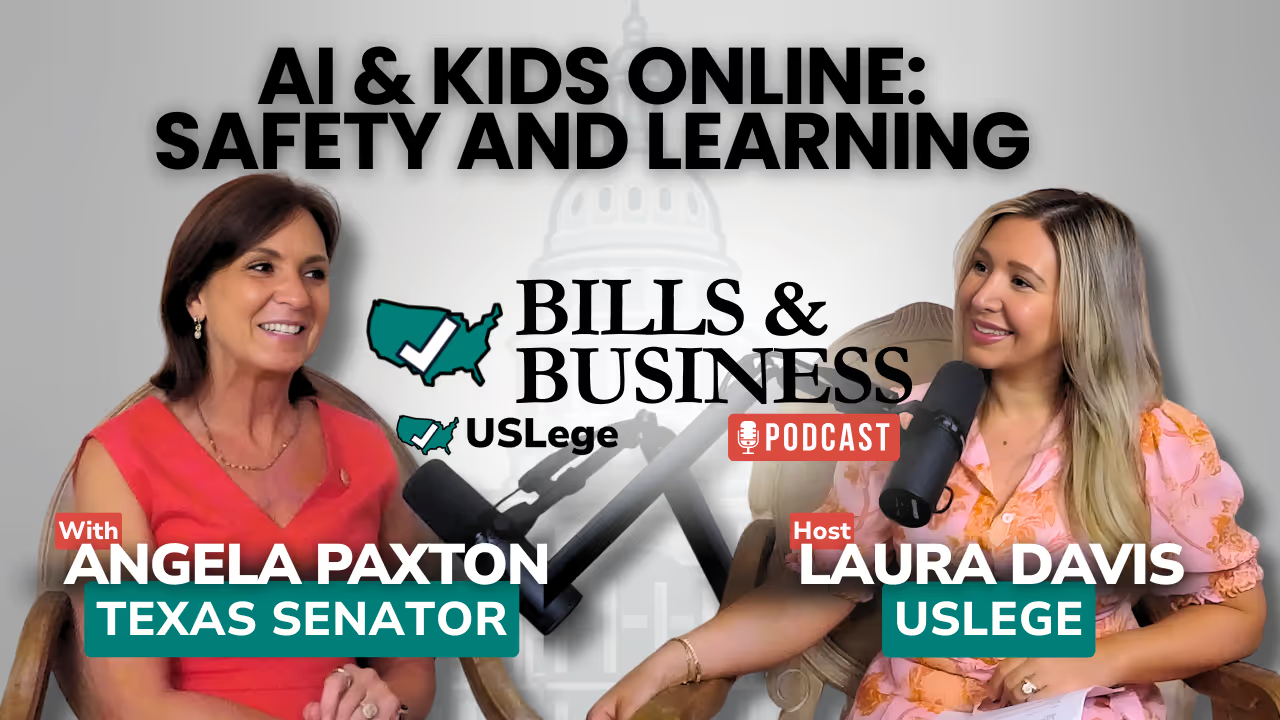
#38 - Senator Angela Paxton: AI and Kids Online. Safety and Learning
Welcome to Episode #38 of Bills & Business. In this episode, Laura Davis, Co-Founder of USLege, sits down with Senator Angela Paxton, who represents Senate District 8 in the Texas Senate.
Senator Paxton has been a prominent advocate in education, innovation, and online safety. As a mother, grandmother, and former educator, she has supported landmark legislation like House Bill 1181, Texas’ effort to protect children online that reached the U.S. Supreme Court, and Senate Bill 2420, the App Store Accountability Act, which aims for stronger protections in the digital marketplace.
In this conversation, Senator Paxton shares insights on how families can better navigate the risks of technology, why app store accountability is urgent, and how Texas can set a precedent in protecting children online. She also discusses the promise and peril of artificial intelligence, what excites her, what worries her, and whether Texas should consider a pause or stronger guardrails on AI adoption.
Don’t forget to subscribe to Bills & Business on Apple Podcasts, Spotify, and YouTube for more deep dives into Texas policy and business news.
📲 Follow Laura Carr
🐦 Twitter: @Laura_USLege https://x.com/Laura_USLege
💼 LinkedIn: https://www.linkedin.com/in/laurauslege/
📸 Instagram: https://www.instagram.com/thereallauracarr/
🛍️ ShopMy: https://shopmy.us/shop/lauraluise?Section_title=latest-finds&tab=collections
✍️ Substack: https://lauraluise.substack.com/
🔗 Links: https://lauraluise.carrd.co/
📲 Follow USLege
✨ Instagram: https://www.instagram.com/uslege.ai/
📘 Facebook: https://www.facebook.com/USLegeai
🐦 Twitter: @USLege_ai https://x.com/USLege_ai
💼 LinkedIn: https://www.linkedin.com/company/uslege-ai/
🌐 Website: https://www.uslege.ai/
🎧 Subscribe to Bills & Business
▶️ YouTube: https://www.youtube.com/@BillsandBusiness
🎵 Spotify: https://open.spotify.com/show/22ZWg9VVb2AEGqyV14osNi?si=effe3795f8414171
🍎 Apple Podcasts: https://podcasts.apple.com/ph/podcast/bills-and-business-by-uslege/id1781059329
🎥 TikTok: https://www.tiktok.com/@billsandbusiness
📲 Follow Senator Angela Paxton
💼 LinkedIn: https://www.linkedin.com/in/angela-paxton-b2778157/
🐦 Twitter: https://x.com/AngelaPaxtonTX
📘 Facebook: https://www.facebook.com/SenPaxton/
✨ Instagram: https://www.instagram.com/angelapaxtontx/?hl=en
🎬 Produced by USLege
📞 Want to see USLege in action? Schedule a demo today! https://www.uslege.ai/demo
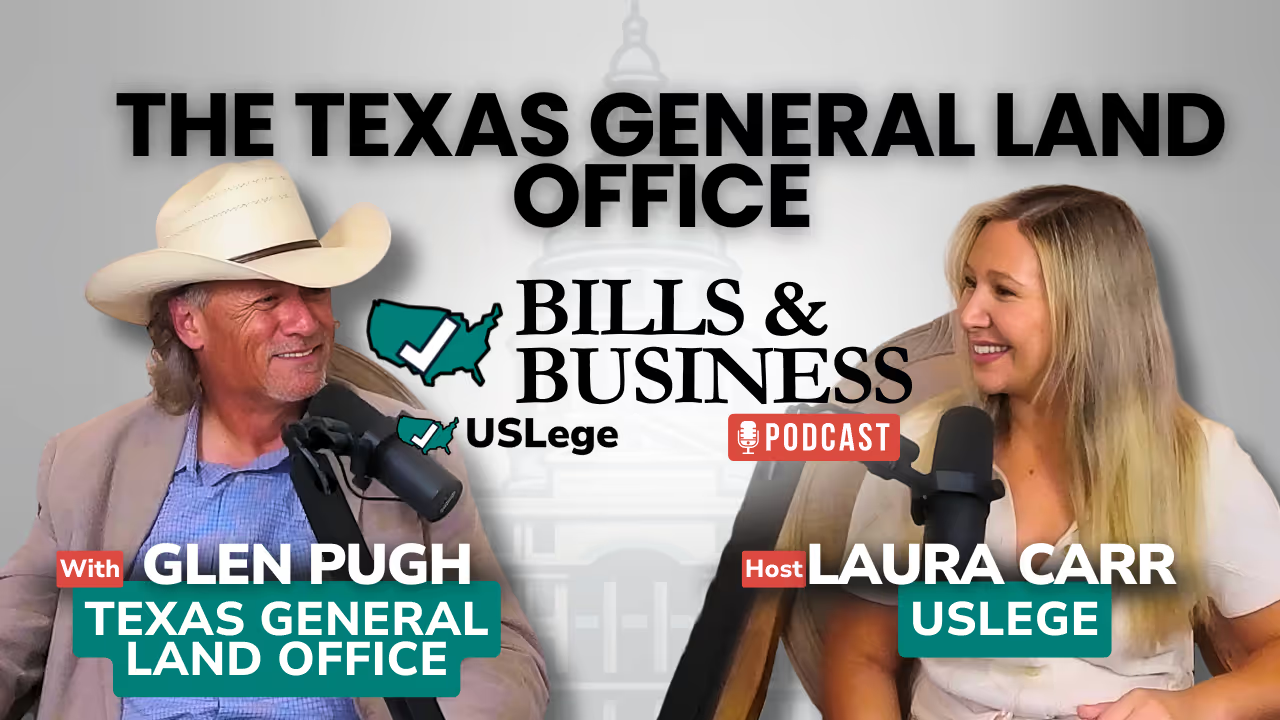
#37 - Glen Pugh: Texas General Land Office
Welcome to Episode #37 of Bills & Business. In this episode, Laura Carr, Co-Founder of USLege, sits down with Glen Pugh from the Texas General Land Office (GLO), a government relations leader at one of Texas’s most impactful agencies.
The conversation begins with an overview of the GLO’s wide-ranging responsibilities, from land management and energy leasing to disaster recovery and coastal protection. Glen explains how the Land Commissioner’s leadership shapes the agency’s priorities and clears up common misconceptions about the GLO’s work.
Laura and Glen dive into the intersection of economics, energy, and public policy. They explore how the GLO’s leasing programs generate revenue for Texas schools, the agency’s critical role in Hurricane Harvey recovery, and the balancing act between coastal protection, environmental stewardship, and energy development. Glen also shares how technology and transparency are modernizing state operations and highlights opportunities for businesses to engage with the agency.
In a more personal reflection, Glen opens up about what drew him to government service, the challenges of legislative coordination, and the moments that fuel his passion for public policy. The episode closes with practical takeaways for Texas businesses looking to connect with the GLO through procurement, grants, and land use opportunities.
Don’t forget to subscribe to Bills & Business on Apple Podcasts, Spotify, and YouTube for more deep dives into Texas policy and business news.
📲 Follow Laura Carr
🐦 Twitter: @Laura_USLege https://x.com/Laura_USLege
💼 LinkedIn: https://www.linkedin.com/in/laurauslege/
📸 Instagram: https://www.instagram.com/thereallauracarr/
🛍️ ShopMy: https://shopmy.us/shop/lauraluise?Section_title=latest-finds&tab=collections
✍️ Substack: https://lauraluise.substack.com/
🔗 Links: https://lauraluise.carrd.co/
📲 Follow USLege
✨ Instagram: https://www.instagram.com/uslege.ai/
📘 Facebook: https://www.facebook.com/USLegeai
🐦 Twitter: @USLege_ai https://x.com/USLege_ai
💼 LinkedIn: https://www.linkedin.com/company/uslege-ai/
🎧 Subscribe to Bills & Business
🌐 Website: https://www.uslege.ai/
▶️ YouTube: https://www.youtube.com/@BillsandBusiness
🎵 Spotify: https://open.spotify.com/show/22ZWg9VVb2AEGqyV14osNi?si=effe3795f8414171
🍎 Apple Podcasts: https://podcasts.apple.com/ph/podcast/bills-and-business-by-uslege/id1781059329
🎥 TikTok: https://www.tiktok.com/@billsandbusiness
📲 Follow Glen Pugh
🐦 Twitter: https://x.com/gpugh40
💼 LinkedIn: https://www.linkedin.com/in/wendell-glen-pugh-259a222b/
🎬 Produced by USLege
📞 Want to see USLege in action? Schedule a demo today! https://www.uslege.ai/demo

#36 - Renzo Soto: Tech Policy Advancement with TechNet
Welcome to Episode #36 of Bills & Business. In this episode, Laura Carr, Co-Founder of USLege, sits down with Renzo Soto, Executive Director for Texas and the Southeast at TechNet, a leading network of technology CEOs and senior executives advocating for innovation-friendly policies.
Renzo shares his inspiring journey from immigrating to Harlingen, Texas, to shaping tech policy at the highest levels. He reflects on his time in the Texas Legislature, his work on education and workforce development, and his transition into tech advocacy.
The conversation explores the pressing challenges and opportunities in Texas tech policy:
- Cybersecurity & State Modernization – How Texas can protect its digital infrastructure and embrace 21st-century systems.
- Workforce & Education – Building an inclusive talent pipeline to support rapid tech job growth.
- AI & Emerging Tech Policy – Balancing innovation with safety and fairness, and how Texas compares to other states like Florida and Georgia.
Renzo also offers advice to young professionals and underrepresented communities aspiring to make an impact in tech and public policy, while sharing his vision for Texas as a national leader in smart, inclusive technology policy.
Don’t forget to subscribe to Bills & Business on Apple Podcasts, Spotify, and YouTube for more deep dives into Texas policy and business news.
📲 Follow Laura Carr
🐦 Twitter: @Laura_USLege https://x.com/Laura_USLege
💼 LinkedIn: https://www.linkedin.com/in/laurauslege/
📸 Instagram: https://www.instagram.com/thereallauracarr/
🛍️ ShopMy: https://shopmy.us/shop/lauraluise?Section_title=latest-finds&tab=collections
✍️ Substack: https://lauraluise.substack.com/
🔗 Links: https://lauraluise.carrd.co/
📲 Follow USLege
✨ Instagram: https://www.instagram.com/uslege.ai/
📘 Facebook: https://www.facebook.com/USLegeai
🐦 Twitter: @USLege_ai https://x.com/USLege_ai
💼 LinkedIn: https://www.linkedin.com/company/uslege-ai/
🎧 Subscribe to Bills & Business
🌐 Website: https://www.uslege.ai/
▶️ YouTube: https://www.youtube.com/@BillsandBusiness
🎵 Spotify: https://open.spotify.com/show/22ZWg9VVb2AEGqyV14osNi?si=effe3795f8414171
🍎 Apple Podcasts: https://podcasts.apple.com/ph/podcast/bills-and-business-by-uslege/id1781059329
🎥 TikTok: https://www.tiktok.com/@billsandbusiness
📲 Follow Renzo Soto
🐦 Twitter: https://x.com/renzo_soto21
💼 LinkedIn: https://www.linkedin.com/in/jannlcsoto/
📲 Follow TechNet
🐦 Twitter: https://x.com/technetupdate
💼 LinkedIn: https://www.linkedin.com/company/technet_2/
🎬 Produced by USLege
📞 Want to see USLege in action? Schedule a demo today! https://www.uslege.ai/demo
.avif)
#35 - Katherine McLane: Crisis Comms, Influence & Messaging at Mach 1
Welcome to Episode #35 of Bills & Business. In this episode, Laura Carr, Co-Founder of USLege, sits down with Katherine McLane—Founder and CEO of The Mach 1 Group.
Katherine brings decades of experience at the intersection of public affairs, politics, and crisis communications. From the Bush administration to LIVESTRONG and Governor Schwarzenegger’s team, she’s led messaging for some of the most visible figures and high-stakes causes in the country. Today, her firm, The Mach 1 Group, is a go-to partner for public figures, nonprofits, and major organizations navigating complex communications challenges in Texas and beyond.
In this conversation, Katherine shares actionable insights on how effective messaging shapes public policy, why Texas organizations must prepare before a crisis hits, and what startup founders need to know about building influence. She and Laura explore the shifting media landscape, the importance of authenticity in storytelling, and how regional organizations can gain visibility at the Capitol. Katherine also reflects on how communication strategies are evolving in the age of AI, digital noise, and high-stakes narratives.
Don’t forget to subscribe to Bills & Business on Apple Podcasts, Spotify, and YouTube for more deep dives into Texas policy and business news.
📲 Follow Laura Carr
🐦 Twitter: @Laura_USLege https://x.com/Laura_USLege
💼 LinkedIn: https://www.linkedin.com/in/laurauslege/
📸 Instagram: https://www.instagram.com/thereallauracarr/
🛍️ ShopMy: https://shopmy.us/shop/lauraluise?Section_title=latest-finds&tab=collections
✍️ Substack: https://lauraluise.substack.com/
🔗 Links: https://lauraluise.carrd.co/
📲 Follow USLege
✨ Instagram: https://www.instagram.com/uslege.ai/
📘 Facebook: https://www.facebook.com/USLegeai
🐦 Twitter: @USLege_ai https://x.com/USLege_ai
💼 LinkedIn: https://www.linkedin.com/company/uslege-ai/
🎧 Subscribe to Bills & Business
🌐 Website: https://www.uslege.ai/
▶️ YouTube: https://www.youtube.com/@BillsandBusiness
🎵 Spotify: https://open.spotify.com/show/22ZWg9VVb2AEGqyV14osNi?si=effe3795f8414171
🍎 Apple Podcasts: https://podcasts.apple.com/ph/podcast/bills-and-business-by-uslege/id1781059329
🎥 TikTok: https://www.tiktok.com/@billsandbusiness
📲 Follow Katherine McLane
🐦 Twitter: https://x.com/katherinemclane?lang=en
📘 Facebook: https://www.facebook.com/katherine.mclane/
💼 LinkedIn: https://www.linkedin.com/in/katherine-mclane-7550a3a/
🎬 Produced by USLege
📞 Want to see USLege in action? Schedule a demo today! https://www.uslege.ai/demo
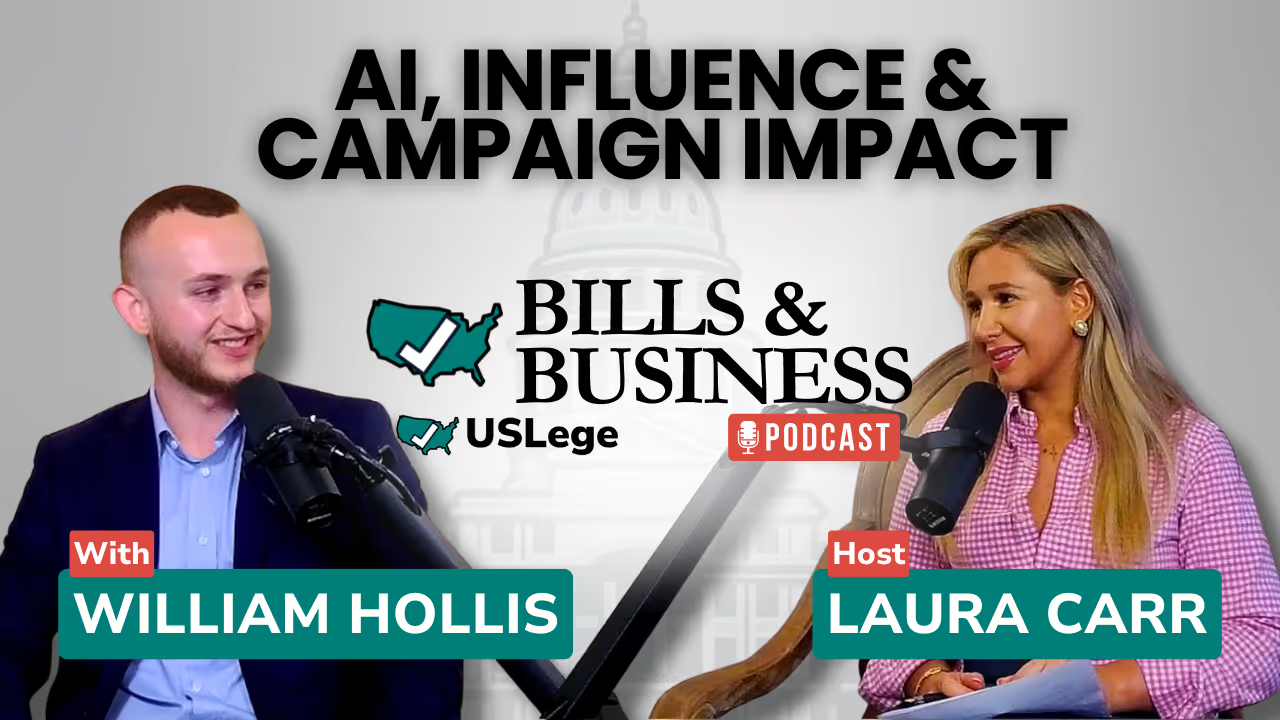
#34 - William Hollis: Redefining Advocacy Through AI, Influence & Campaign Impact
Welcome to Episode #34 of Bills & Business. In this episode, Laura Carr, Co-Founder of USLege, sits down with William Hollis, CEO of Campaigns Inc. and a leading force in digital public affairs strategy.
As traditional media influence fades and attention spans shrink, William Hollis is ushering in a new era of political communication. From campaign storytelling to creator partnerships, William shares how Campaigns Inc. helps mission-driven organizations cut through the noise and build real momentum online. Whether it’s defending policy, shaping public opinion, or mobilizing local communities, William’s digital-first approach is redefining how advocacy gets done.
Laura and William dive into the decline of legacy media, the rise of trusted creators, and how AI and hyper-targeting are shifting campaign strategy in 2025. If you're working in advocacy, government, or civic tech—or just trying to make sense of today’s political landscape—this episode is packed with insight.
Don’t forget to subscribe to Bills & Business on Apple Podcasts, Spotify, and YouTube for more deep dives into Texas policy and business news.
📲 Follow Laura Carr
🐦 Twitter: @Laura_USLege https://x.com/Laura_USLege
💼 LinkedIn: https://www.linkedin.com/in/laurauslege/
📸 Instagram: https://www.instagram.com/thereallauracarr/
🛍️ ShopMy: https://shopmy.us/shop/lauraluise?Section_title=latest-finds&tab=collections
✍️ Substack: https://lauraluise.substack.com/
🔗 Links: https://lauraluise.carrd.co/
📲 Follow USLege
✨ Instagram: https://www.instagram.com/uslege.ai/
📘 Facebook: https://www.facebook.com/USLegeai
🐦 Twitter: @USLege_ai https://x.com/USLege_ai
💼 LinkedIn: https://www.linkedin.com/company/uslege-ai/
🌐 Website: https://www.uslege.ai/
🎧 Subscribe to Bills & Business
▶️ YouTube: https://www.youtube.com/@BillsandBusiness
🎵 Spotify: https://open.spotify.com/show/22ZWg9VVb2AEGqyV14osNi?si=effe3795f8414171
🍎 Apple Podcasts: https://podcasts.apple.com/ph/podcast/bills-and-business-by-uslege/id1781059329
🎥 TikTok: https://www.tiktok.com/@billsandbusiness
📲 Follow William Hollis
🐦 Twitter: https://x.com/williamthollis
📘 LinkedIn: https://www.linkedin.com/in/williamthollis/?originalSubdomain=ca
📸 Instagram: https://www.instagram.com/willthollis/
🎬 Produced by USLege
📞 Want to see USLege in action? Schedule a demo today! https://www.uslege.ai/demo
.avif)
#33 - Bills & Business Live From Texas Venture Forum
Welcome to Episode #33 of Bills & Business. In this episode, host Laura Carr takes you behind the scenes at the Texas Venture Gala for a dynamic compilation of interviews with 7 bold leaders shaping the future of innovation, entrepreneurship, and policy. 🎤📍
Recorded live, this episode delivers a fast-paced mix of insight, humor, and real talk—from middle school marketing stories and 19-year-old entrepreneurs, to how chambers of commerce are emerging as political powerhouses and what it takes to build successful public-private partnerships. 💬⚡
🎙️ Featuring:
💡 Rodney Davis – Head of Government Affairs, U.S. Chamber of Commerce
💡 Ted Townsend – President & CEO, Greater Memphis Chamber
💡 Marcos Cervantes – Founder & CEO, Q Branch
💡 Danny Seiden – President & CEO, Arizona Chamber of Commerce & Industry
💡 Jessika Calder – Policy Intern, Texas AI Association
💡 William Steele – CEO & Co-Founder, Supply Pay
💡 Mark Crumblish – Co-Founder & CEO, Eagle Venture Lab
💡 Cherie Werner – Founder, FIESTA
Whether you're in tech, policy, or business, this special episode is packed with fresh ideas, unexpected moments, and sharp insight from across the innovation ecosystem.
📲 Follow Laura Carr
🐦 Twitter: @Laura_USLege https://x.com/Laura_USLege
💼 LinkedIn: https://www.linkedin.com/in/laurauslege/
📸 Instagram: https://www.instagram.com/thereallauracarr/
🛍️ ShopMy: https://shopmy.us/shop/lauraluise?Section_title=latest-finds&tab=collections
✍️ Substack: https://lauraluise.substack.com/
🔗 Links: https://lauraluise.carrd.co/
📲 Follow USLege
✨ Instagram: https://www.instagram.com/uslege.ai/
📘 Facebook: https://www.facebook.com/USLegeai
🐦 Twitter: @USLege_ai https://x.com/USLege_ai
💼 LinkedIn: https://www.linkedin.com/company/uslege-ai/
🌐 Website: [www.uslege.ai](https://www.uslege.ai/)
▶️ YouTube: https://www.youtube.com/@BillsandBusiness
🎵 Spotify: Bills and Business by USLege https://open.spotify.com/show/22ZWg9VVb2AEGqyV14osNi?si=effe3795f8414171
🍎 Apple Podcasts: Bills and Business by USLege https://podcasts.apple.com/ph/podcast/bills-and-business-by-uslege/id1781059329
🎥 TikTok: https://www.tiktok.com/ @BillsandBusiness
📲 Follow Rodney Davis
🐦 Twitter: https://x.com/rodneydavis?lang=en
💼 LinkedIn: https://www.linkedin.com/in/hon-rodney-davis-7496b24/
📲 Follow Ted Townsend
🐦 Twitter: https://x.com/TedTownsend901
💼 LinkedIn: https://www.linkedin.com/in/tedtownsend901/
📲 Follow Marcos Cervantes
🐦 Twitter: https://x.com/MarcCervantes_Q
💼 LinkedIn: https://www.linkedin.com/in/atx-maverick/
📲 Follow Danny Seiden
🐦 Twitter: https://x.com/dbseiden
💼 LinkedIn: https://www.linkedin.com/in/danny-seiden-b9b82914/
📲 Follow Jessika Calder
💼 LinkedIn: https://www.linkedin.com/in/jessika-calder-w/
📲 Follow Mark Crumblish
💼 LinkedIn: https://www.linkedin.com/in/markcrumblish/
📲 Follow William Steele
💼 LinkedIn: https://www.linkedin.com/in/william-e-steele/
📲 Follow Cheri Werner
🐦 Twitter: https://x.com/cheriewerner
💼 LinkedIn: https://www.linkedin.com/in/cherie-werner/?utm_source=share&utm_campaign=share_via&utm_content=profile&utm_medium=ios_app
🎬 Produced by USLege
📞 Want to see USLege in action? Schedule a demo today! https://www.uslege.ai/demo
.avif)
#32 - Desiree Castro: The Intersection of Fuel, RTDs, and Retail Policy - A Deep Dive
Welcome to Episode #32 of Bills & Business. In this episode, host Laura Carr is joined by Desiree Castro, Director of Government Relations at the Texas Food & Fuel Association. With over a decade of legislative experience, Desiree unpacks the key policy battles affecting Texas retailers—from spirit-based RTDs and fuel theft to swipe fee reform.
They explore the stakes of SB 2225 and the push to modernize alcohol regulations for convenience retailers. The conversation then shifts to SB 1499 and the rise of organized motor fuel theft, examining how proposed legislation could help prevent fraud across the state. Finally, Desiree breaks down how hidden swipe fees affect independent retailers and what reforms may be on the horizon.
Tune in as Laura and Desiree discuss how the Texas Legislature is responding to the evolving needs of retail businesses—and what business owners can do to stay involved.
Don’t forget to subscribe to Bills & Business on Apple Podcast, Spotify, and YouTube for more conversations at the intersection of business and public policy.
📲 Follow Laura Carr
🐦 Twitter: @Laura_USLege https://x.com/Laura_USLege
💼 LinkedIn: https://www.linkedin.com/in/laurauslege/
📸 Instagram: https://www.instagram.com/thereallauracarr/
🛍️ ShopMy: https://shopmy.us/shop/lauraluise?Section_title=latest-finds&tab=collections
✍️ Substack: https://lauraluise.substack.com/
🔗 Links: https://lauraluise.carrd.co/
📲 Follow USLege
✨ Instagram: https://www.instagram.com/uslege.ai/
📘 Facebook: https://www.facebook.com/USLegeai
🐦 Twitter: @USLege_ai https://x.com/USLege_ai
💼 LinkedIn: https://www.linkedin.com/company/uslege-ai/
🎧 Subscribe to Bills & Business
🌐 Website: [www.uslege.ai](https://www.uslege.ai/)
▶️ YouTube: https://www.youtube.com/@BillsandBusiness
🎵 Spotify: Bills and Business by USLege https://open.spotify.com/show/22ZWg9VVb2AEGqyV14osNi?si=effe3795f8414171
🍎 Apple Podcasts: Bills and Business by USLege https://podcasts.apple.com/ph/podcast/bills-and-business-by-uslege/id1781059329
🎥 TikTok: https://www.tiktok.com/ @BillsandBusiness
📲 Follow Desiree Castro
🐦 Twitter: https://x.com/Desiree_Castro3
💼 LinkedIn: https://www.linkedin.com/in/desiree-castro-84261133/
🎬 Produced by USLege
📞 Want to see USLege in action? Schedule a demo today! https://www.uslege.ai/demo
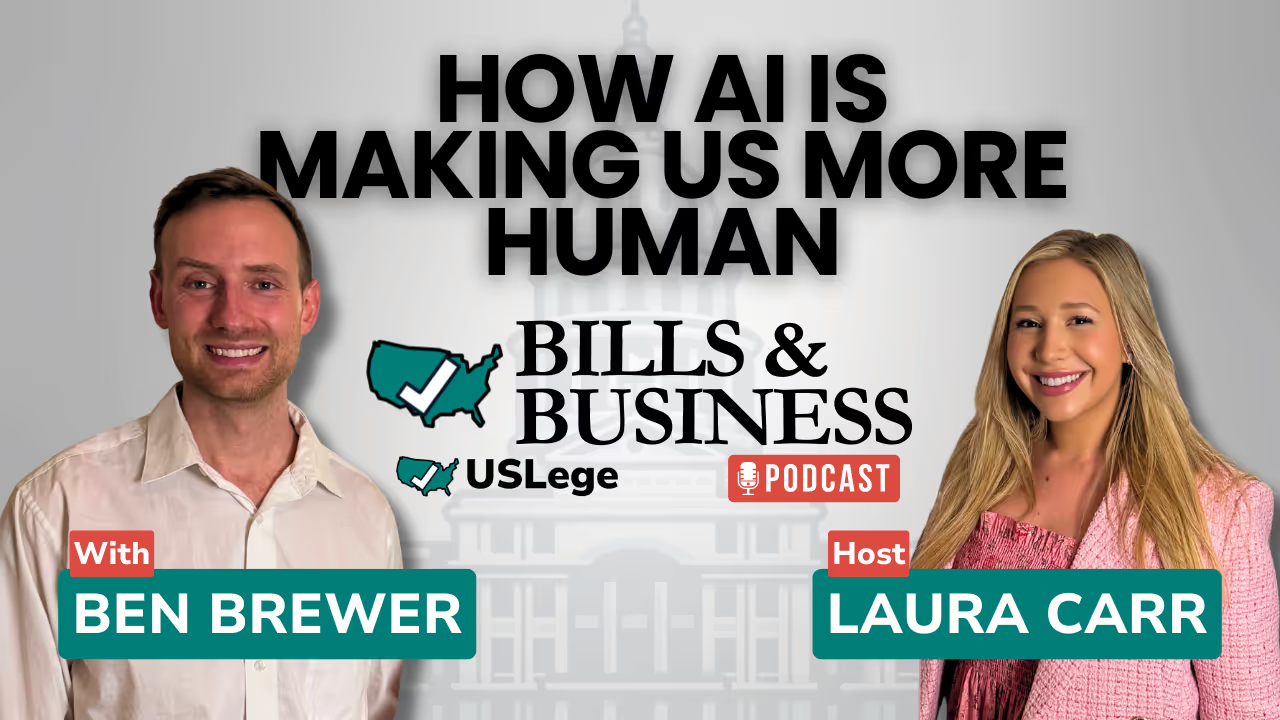
#31 – Ben Brewer: Engineering the Future & How AI Is Making Us More Human
Welcome to Episode #31 of Bills & Business. In this episode, Laura Carr sits down with Ben Brewer, CTO of USLege, to explore how AI and engineering are transforming the legislative space—and why that might actually make us more human, not less.
Ben shares the origin story of USLege, including how a chance match through Y Combinator led to a powerful collaboration between tech and policy. He breaks down what engineering really means in the context of building a platform for legislative work and highlights how smart systems, when used right, can enhance (not replace) human decision-making.
From demystifying AI for lobbyists and staffers to explaining the role of AI agents in streamlining complex workflows, this conversation offers a behind-the-scenes look at the real potential of tech in the public sector. Ben also discusses the importance of human strategy in advocacy, and how the best lobbyists in 2025 will be those who know how to use AI as a tool, not fear it.
Join Laura Carr, Co-Founder of USLege, for a dynamic conversation about the legislative and business priorities that are shaping Texas today and tomorrow.
Don’t forget to subscribe to Bills & Business on Apple podcast, Spotify and YouTube for more in-depth conversations on the key issues impacting Texas.
📲 Follow Laura Carr
🐦 Twitter: @Laura_USLege https://x.com/Laura_USLege
💼 LinkedIn: https://www.linkedin.com/in/laurauslege/
📸 Instagram: https://www.instagram.com/thereallauracarr/
🛍️ ShopMy: https://shopmy.us/shop/lauraluise?Section_title=latest-finds&tab=collections
✍️ Substack: https://lauraluise.substack.com/
🔗 Links: https://lauraluise.carrd.co/
📲 Follow USLege
✨ Instagram: https://www.instagram.com/uslege.ai/
📘 Facebook: https://www.facebook.com/USLegeai
🐦 Twitter: @USLege_ai https://x.com/USLege_ai
💼 LinkedIn: https://www.linkedin.com/company/uslege-ai/
🎧 Subscribe to Bills & Business
🌐 Website: [www.uslege.ai](https://www.uslege.ai/)
▶️ YouTube: https://www.youtube.com/@BillsandBusiness
🎵 Spotify: Bills and Business by USLege https://open.spotify.com/show/22ZWg9VVb2AEGqyV14osNi?si=effe3795f8414171
🍎 Apple Podcasts: Bills and Business by USLege https://podcasts.apple.com/ph/podcast/bills-and-business-by-uslege/id1781059329
🎥 TikTok: https://www.tiktok.com/ @BillsandBusiness
📲 Follow Ben Brewer
🐦 Twitter: https://x.com/brewer_bowman
💼 LinkedIn: https://www.linkedin.com/in/ben-brewer/
🎬 Produced by USLege
📞 Want to see USLege in action? Schedule a demo today! https://www.uslege.ai/demo
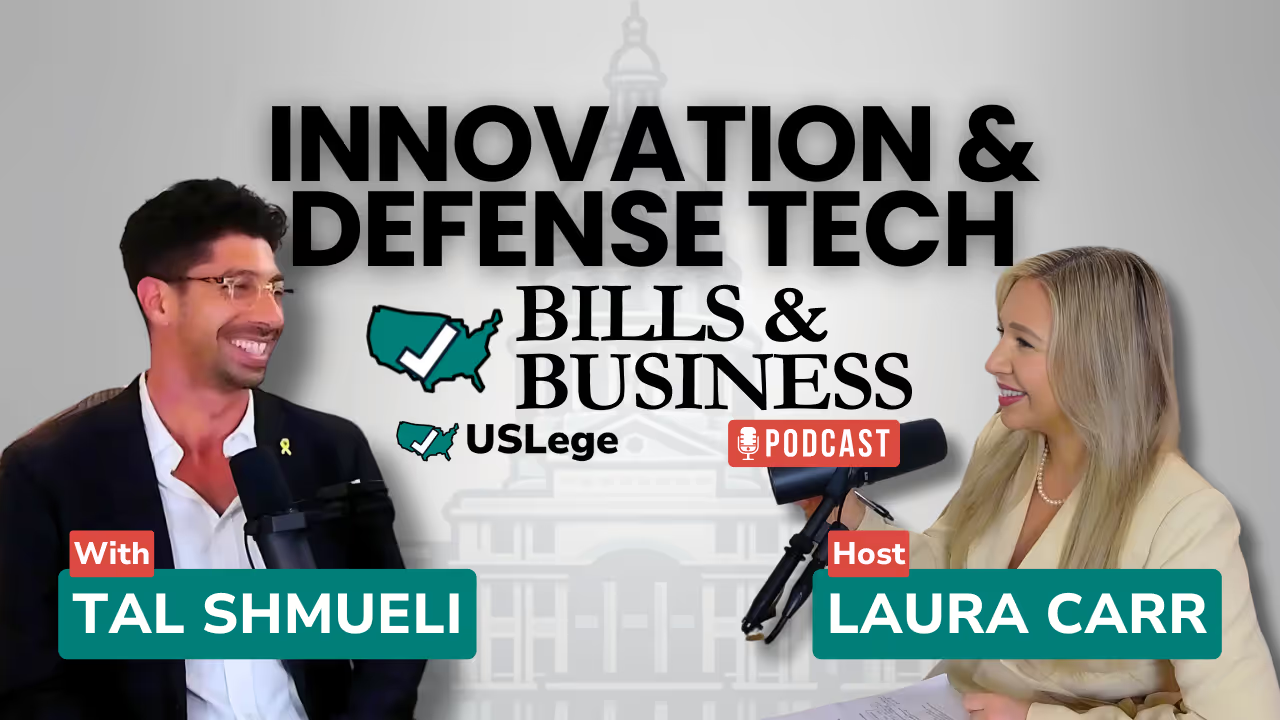
#30 - Tal Shmueli: Bridging Israeli Innovation & Texas Defense Tech
Welcome to Episode #30 of Bills & Business. In this episode, Laura Carr, Co-founder of USLege, sits down with Tal Shmueli, COO & Partner at Texas Venture Partners, a $50 million fund investing in Israeli startups with battlefield-proven technologies and helping them scale in the United States.
Tal shares his journey from Israel to Austin, and how the events of October 7 reshaped his mission to fund innovation that protects lives and advances defense capabilities. From asymmetric warfare to mentorship-driven investment models, Tal explains why Texas is becoming a prime destination for defense tech and how his fund aligns with the U.S. Department of Defense’s 14 critical technology areas.
This episode also explores the evolving U.S.–Israel tech bridge, venture capital trends in national security, and the emotional stories of founders innovating in real-time from the frontlines.
Join host Laura Carr for a powerful conversation at the intersection of geopolitics, innovation, and entrepreneurial grit.
Don’t forget to subscribe to Bills & Business on Apple podcast, Spotify and YouTube for more in-depth conversations on the key issues impacting Texas.
📲 Follow Laura Carr
🐦 Twitter: @Laura_USLege https://x.com/Laura_USLege
💼 LinkedIn: https://www.linkedin.com/in/laurauslege/
📸 Instagram: https://www.instagram.com/thereallauracarr/
🛍️ ShopMy: https://shopmy.us/shop/lauraluise?Section_title=latest-finds&tab=collections
✍️ Substack: https://lauraluise.substack.com/
🔗 Links: https://lauraluise.carrd.co/
📲 Follow USLege
✨ Instagram: https://www.instagram.com/uslege.ai/
📘 Facebook: https://www.facebook.com/USLegeai
🐦 Twitter: @USLege_ai https://x.com/USLege_ai
💼 LinkedIn: https://www.linkedin.com/company/uslege-ai/
🎧 Subscribe to Bills & Business
🌐 Website: [www.uslege.ai](https://www.uslege.ai/)
▶️ YouTube: https://www.youtube.com/@BillsandBusiness
🎵 Spotify: Bills and Business by USLege https://open.spotify.com/show/22ZWg9VVb2AEGqyV14osNi?si=effe3795f8414171
🍎 Apple Podcasts: Bills and Business by USLege https://podcasts.apple.com/ph/podcast/bills-and-business-by-uslege/id1781059329
🎥 TikTok: https://www.tiktok.com/ @BillsandBusiness
📲 Follow Tal Shmueli
💼 LinkedIn: https://www.linkedin.com/in/tshmueli/
🎬 Produced by USLege
📞 Want to see USLege in action? Schedule a demo today! https://www.uslege.ai/demo
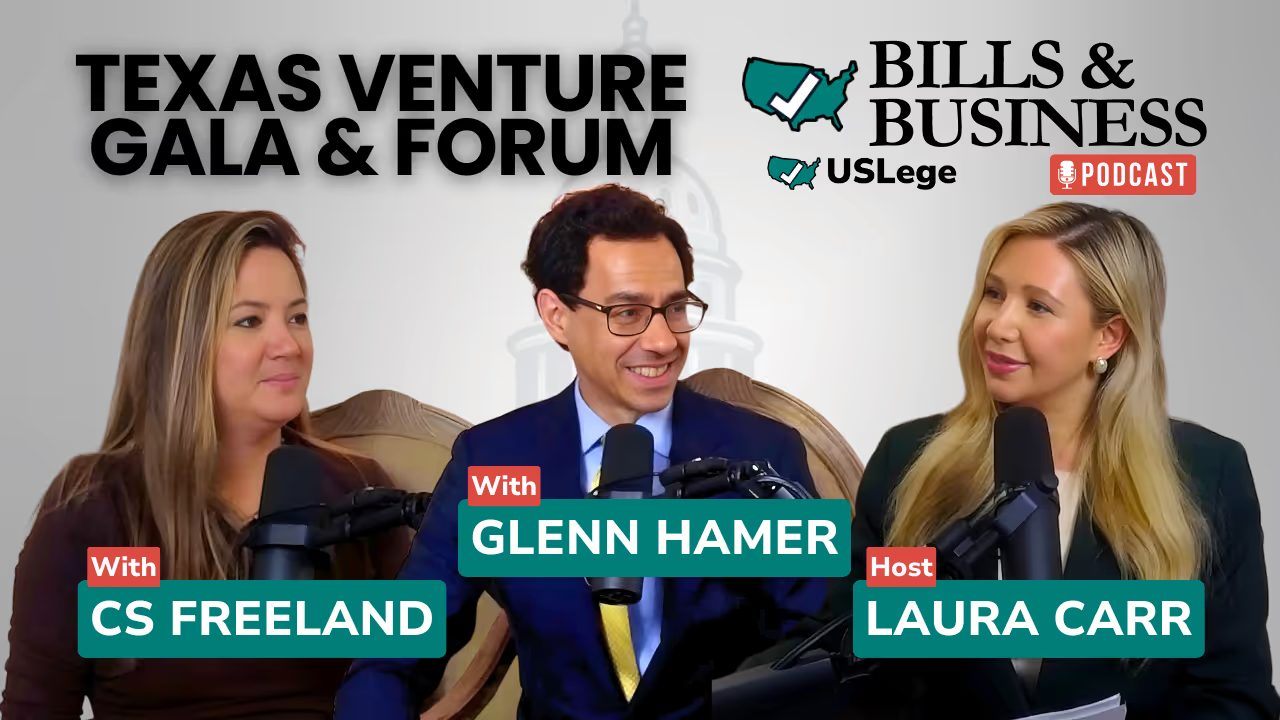
#29 - Glenn Hamer & CS Freeland: Driving Texas Innovation Through the Texas Venture Gala & Forum
Welcome to Episode #29 of Bills & Business. In this episode, we’re joined by Glenn Hamer, CEO of the Texas Association of Business and Founding Chairman of the Texas Venture Alliance, along with CS Freeland, Founder of the Texas Venture Alliance and creator of the Texas Venture Voter Guide. Together, they offer an exclusive look into Texas' innovation economy and the powerful forces shaping its future.
Glenn Hamer shares how the Texas Venture Alliance is connecting entrepreneurs, investors, and policymakers to accelerate the state’s leadership in innovation. He also gives a preview of the upcoming Texas Venture Gala, an event bringing together business leaders to celebrate and advance Texas’ venture ecosystem.
CS Freeland dives deeper into the vision behind the Alliance, the importance of strategic political engagement through initiatives like the Texas Venture Voter Guide, and her own journey as a leader shaping innovation policy in Texas. She offers valuable advice to emerging leaders and gives a sneak peek at what’s next after the Gala for Texas’ innovation scene.
Join Laura Carr, Co-Founder of USLege, for this dynamic conversation about the people and events driving business growth and innovation across Texas today.
Don’t forget to subscribe to Bills & Business on Apple podcast, Spotify and YouTube for more in-depth conversations on the key issues impacting Texas.
📲 Follow Laura Carr
🐦 Twitter: @Laura_USLege https://x.com/Laura_USLege
💼 LinkedIn: https://www.linkedin.com/in/laurauslege/
📸 Instagram: https://www.instagram.com/thereallauracarr/
🛍️ ShopMy: https://shopmy.us/shop/lauraluise?Section_title=latest-finds&tab=collections
✍️ Substack: https://lauraluise.substack.com/
🔗 Links: https://lauraluise.carrd.co/
📲 Follow USLege
✨ Instagram: https://www.instagram.com/uslege.ai/
📘 Facebook: https://www.facebook.com/USLegeai
🐦 Twitter: @USLege_ai https://x.com/USLege_ai
💼 LinkedIn: https://www.linkedin.com/company/uslege-ai/
🎧 Subscribe to Bills & Business
🌐 Website: [www.uslege.ai](https://www.uslege.ai/)
▶️ YouTube: https://www.youtube.com/@BillsandBusiness
🎵 Spotify: Bills and Business by USLege https://open.spotify.com/show/22ZWg9VVb2AEGqyV14osNi?si=effe3795f8414171
🍎 Apple Podcasts: Bills and Business by USLege https://podcasts.apple.com/ph/podcast/bills-and-business-by-uslege/id1781059329
🎥 TikTok: https://www.tiktok.com/ @BillsandBusiness
📲 Follow CS Freeland
✨ Instagram: https://www.instagram.com/cs_freeland/
📘 Facebook: https://www.facebook.com/christa.freeland/
🐦 Twitter: https://x.com/cs_freeland
💼 LinkedIn: https://www.linkedin.com/in/csfreeland/
📲 Follow Glenn Hamer
✨ Instagram: https://www.instagram.com/glennhamer/
🐦 Twitter: https://x.com/GlennHamer
💼 LinkedIn: https://www.linkedin.com/in/glennhamer/
🎬 Produced by USLege
📞 Want to see USLege in action? Schedule a demo today! https://www.uslege.ai/demo
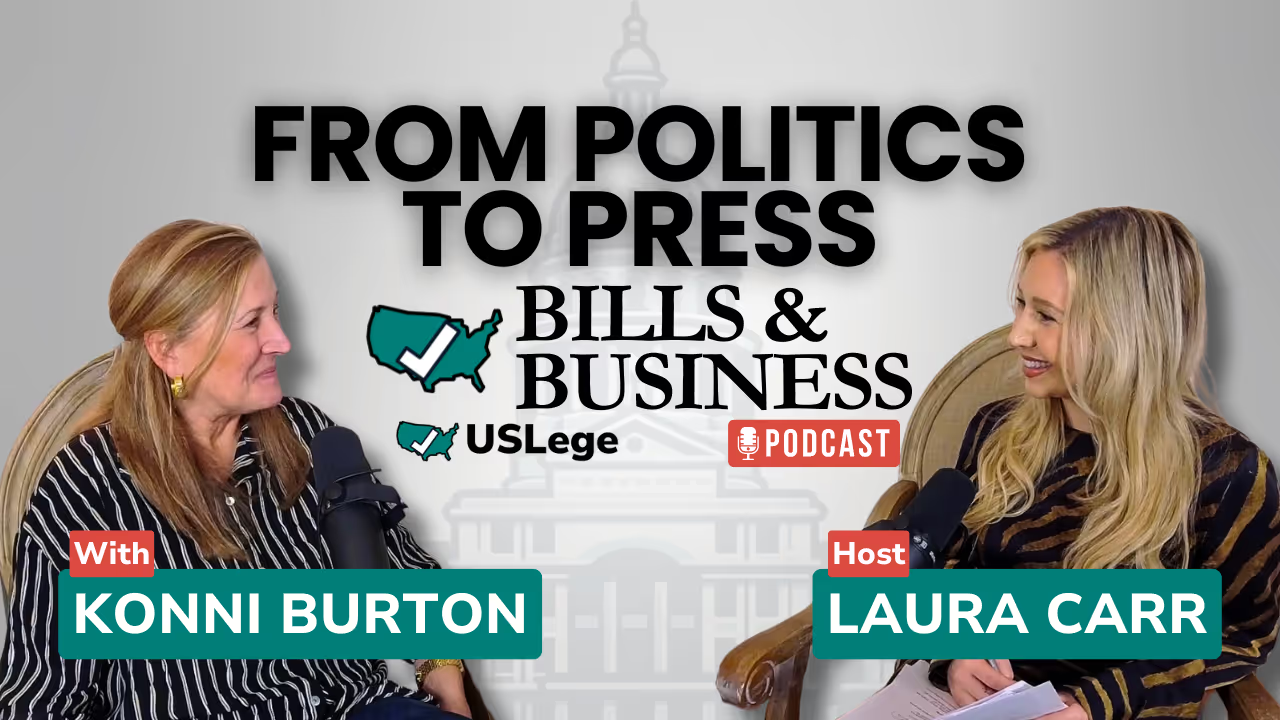
#28 - Konni Burton: From Politics To Press
Welcome to Episode #28 of Bills & Business. In this episode, Laura Carr, Co-Founder of USLege, sits down with Konni Burton—former Texas State Senator, grassroots advocate, and founder of The Texan.
Konni shares her journey from growing up in South Texas, launching a business, and stepping into the political arena to advocate for limited government, individual liberties, and fiscal responsibility. She opens up about her transition from activism to public office, her battles against taxpayer-funded lobbying and corporate welfare, and her efforts in criminal justice reform.
After leaving the Senate, Konni founded The Texan to deliver straight, factual news coverage, offering a fresh take on political journalism in Texas. She also discusses the future of conservative values, government transparency, and her outlook on Texas politics today.
Join Laura Carr for an insightful conversation on leadership, advocacy, and innovation in both government and media.
Don’t forget to subscribe to Bills & Business on Apple Podcasts, Spotify, and YouTube for more deep dives into Texas policy and business news.
📲 Follow Laura Carr
🐦 Twitter: @Laura_USLege https://x.com/Laura_USLege
💼 LinkedIn: https://www.linkedin.com/in/laurauslege/
📸 Instagram: https://www.instagram.com/thereallauracarr/
🛍️ ShopMy: https://shopmy.us/shop/lauraluise?Section_title=latest-finds&tab=collections
✍️ Substack: https://lauraluise.substack.com/
🔗 Links: https://lauraluise.carrd.co/
📲 Follow USLege
✨ Instagram: https://www.instagram.com/uslege.ai/
📘 Facebook: https://www.facebook.com/USLegeai
🐦 Twitter: @USLege_ai https://x.com/USLege_ai
💼 LinkedIn: https://www.linkedin.com/company/uslege-ai/
🎧 Subscribe to *Bills & Business
🌐 Website: [www.uslege.ai](https://www.uslege.ai/)
▶️ YouTube: https://www.youtube.com/@BillsandBusiness
🎵 Spotify: Bills and Business by USLege https://open.spotify.com/show/22ZWg9VVb2AEGqyV14osNi?si=effe3795f8414171
🍎 Apple Podcasts: Bills and Business by USLege https://podcasts.apple.com/ph/podcast/bills-and-business-by-uslege/id1781059329
🎥 TikTok: https://www.tiktok.com/@billsandbusiness
📲 Follow Konni Burton
📘 Facebook: https://www.facebook.com/KonniBurtonTX/
🐦 Twitter: https://x.com/KonniBurton
🎬 Produced by USLege
📞 Want to see USLege in action? Schedule a demo today! https://www.uslege.ai/demo
.avif)
#27 - Andrea Sparks: Protecting Children Online and Building a Movement for Change
Welcome to Episode #27 of Bills & Business. In this episode, host Laura Carr is joined by Andrea Sparks, Co-Founder of Not on Our Watch Texas (NOWTX) and Director of Government Relations at Buckner International. Andrea shares her inspiring journey from law school to leading child protection efforts at the state level, including her pivotal role in creating the Governor’s Child Sex Trafficking Team.
Andrea and Laura dive deep into the realities of child exploitation in the digital age, discussing why smartphones have become the "new white van" and what myths need to be broken around online safety. Andrea also highlights how businesswomen across Texas are stepping into leadership roles through NOWTX to protect children and build a culture of prevention.
Listeners will hear about legislative efforts like SB 2420, strategies to empower communities, and the broader vision for safeguarding families. Andrea’s passion for creating lasting change shines throughout this conversation, offering practical steps for anyone who wants to be part of the solution.
Join Laura Carr, Co-Founder of USLege, for a compelling discussion about turning policy into protection—and why every voice matters in building a safer future for Texas children.
Don’t forget to subscribe to Bills & Business on Apple Podcasts, Spotify, and YouTube for more in-depth conversations on the key issues impacting Texas.
📲 Follow Laura Carr
🐦 Twitter: @Laura_USLege https://x.com/Laura_USLege
💼 LinkedIn: https://www.linkedin.com/in/laurauslege/
📸 Instagram: https://www.instagram.com/thereallauracarr/
🛍️ ShopMy: https://shopmy.us/shop/lauraluise?Section_title=latest-finds&tab=collections
✍️ Substack: https://lauraluise.substack.com/
🔗 Links: https://lauraluise.carrd.co/
📲 Follow USLege
✨ Instagram: https://www.instagram.com/uslege.ai/
📘 Facebook: https://www.facebook.com/USLegeai
🐦 Twitter: @USLege_ai https://x.com/USLege_ai
💼 LinkedIn: https://www.linkedin.com/company/uslege-ai/
🎧 Subscribe to Bills & Business
🌐 Website: [www.uslege.ai](https://www.uslege.ai/)
▶️ YouTube: https://www.youtube.com/@BillsandBusiness
🎵 Spotify: Bills and Business by USLege https://open.spotify.com/show/22ZWg9VVb2AEGqyV14osNi?si=effe3795f8414171
🍎 Apple Podcasts: Bills and Business by USLege https://podcasts.apple.com/ph/podcast/bills-and-business-by-uslege/id1781059329
🎥 TikTok: https://www.tiktok.com/ @BillsandBusiness
📲 Follow Andrea Sparks
✨ Instagram: https://www.linkedin.com/in/andrea-galliano-sparks-91161425/
📘 Facebook: https://www.instagram.com/andigalsparks/reels/
💼 LinkedIn: https://www.facebook.com/andrea.g.sparks/
🎬 Produced by USLege
📞 Want to see USLege in action? Schedule a demo today! https://www.uslege.ai/demo
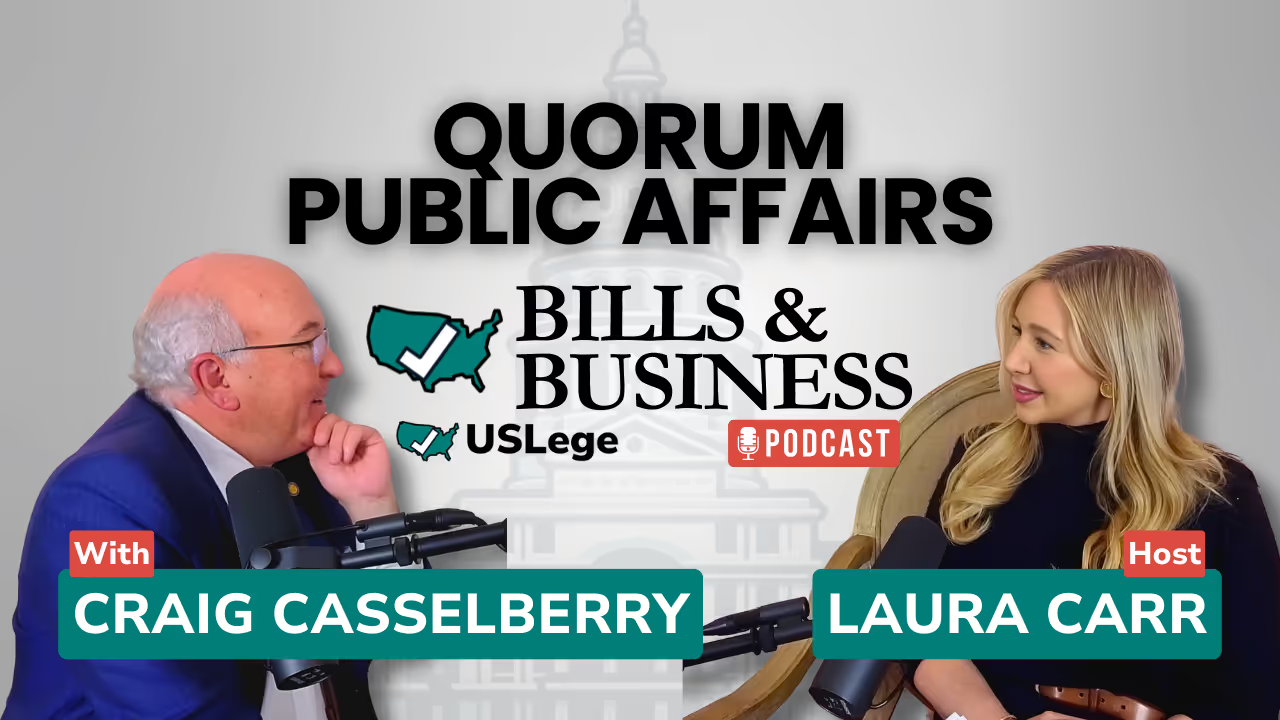
#25 - Craig Casselberry: Winning Policy, Business, and Strategic Communication in Texas
Welcome to Episode #25 of Bills & Business. In this episode, Laura Carr is joined by Craig Casselberry, Founder and CEO of Quorum Public Affairs. With decades of experience in public affairs, Craig has led over 150 corporate communications and legislative campaigns, advised Texas Governors, and collaborated with companies such as ExxonMobil, AT&T, and Pfizer.
This episode explores Craig’s career journey, the intersection of business, government, and communications, and how companies can win in today’s legislative environment. From founding the Texas Coalition for Capital to his insights on infrastructure and the future of Texas' digital economy, Craig offers a wealth of knowledge on how effective advocacy and coalition-building can drive results.
Join host Laura Carr, Co-Founder of USLege, for a powerful discussion on public affairs strategy, policy development, and how businesses can better engage with lawmakers to shape the future of Texas.
Don’t forget to subscribe to Bills & Business on Apple Podcasts, Spotify, and YouTube for more in-depth conversations on the key issues impacting Texas.
📲 Follow Laura Carr
🐦 Twitter: @Laura_USLege https://x.com/Laura_USLege
💼 LinkedIn: https://www.linkedin.com/in/laurauslege/
📸 Instagram: https://www.instagram.com/thereallauracarr/
🛍️ ShopMy: https://shopmy.us/shop/lauraluise?Section_title=latest-finds&tab=collections
✍️ Substack: https://lauraluise.substack.com/
🔗 Links: https://lauraluise.carrd.co/
📲 Follow USLege
🌐 Website: https://www.uslege.ai/
✨ Instagram: https://www.instagram.com/uslege.ai/
📘 Facebook: https://www.facebook.com/USLegeai
🐦 Twitter: @USLege_ai https://x.com/USLege_ai
💼 LinkedIn: https://www.linkedin.com/company/uslege-ai/
🎧 Subscribe to Bills & Business
▶️ YouTube: https://www.youtube.com/@BillsandBusiness
🎵 Spotify: Bills and Business by USLege https://open.spotify.com/show/22ZWg9VVb2AEGqyV14osNi?si=effe3795f8414171
🍎 Apple Podcasts: Bills and Business by USLege https://podcasts.apple.com/ph/podcast/bills-and-business-by-uslege/id1781059329
🎥 TikTok: https://www.tiktok.com/@billsandbusiness
📲 Follow Craig Casselberry
📘 Facebook: https://www.facebook.com/craig.casselberry/
🐦 Twitter: @ccquorum https://x.com/ccquorum
💼 LinkedIn: https://www.linkedin.com/in/craig-casselberry-b01631/
🎬 Produced by USLege
📞 Want to see USLege in action? Schedule a demo today! https://www.uslege.ai/demo
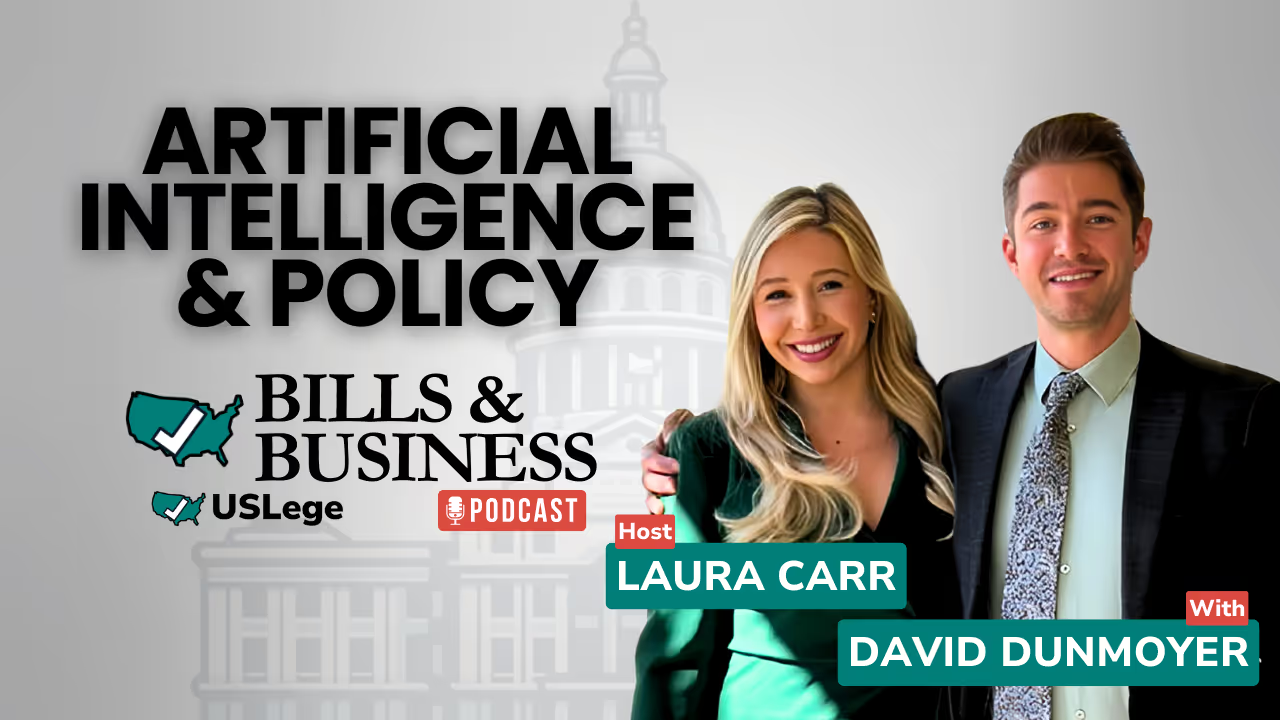
#24 - David Dunmoyer: Artificial Intelligence and Policy
Welcome to Episode #24 of Bills & Business. In this episode, Laura Carr sits down with David Dunmoyer, Campaign Director for Better Tech for Tomorrow and policy expert at the Texas Public Policy Foundation, to explore the evolving landscape of AI regulation in Texas.
David provides insights into Texas House Bill 1709, a legislative effort aimed at balancing AI innovation with critical safeguards. The conversation covers AI’s role in policy, data privacy concerns, and how Texas lawmakers are navigating the rapid advancements in technology.
Beyond AI, David discusses the broader cybersecurity and infrastructure challenges facing Texas, as well as the role of the newly formed DOGE Committee in shaping digital oversight and governance. From AI-driven policy shifts to emerging technology trends, this episode offers key takeaways for businesses, policymakers, and tech leaders alike.
Join Laura Carr for this timely discussion on the intersection of technology and legislation.
Don’t forget to subscribe to Bills & Business on Apple Podcasts, Spotify, and YouTube for more in-depth conversations on the key issues impacting Texas.
📲 Follow Laura Carr
🐦 Twitter: @Laura_USLege https://x.com/Laura_USLege
💼 LinkedIn: https://www.linkedin.com/in/laurauslege/
📸 Instagram: https://www.instagram.com/thereallauracarr/
🛍️ ShopMy: https://shopmy.us/shop/lauraluise?Section_title=latest-finds&tab=collections
✍️ Substack: https://lauraluise.substack.com/
🔗 Links: https://lauraluise.carrd.co/
📲 Follow USLege
🌐 Website: https://www.uslege.ai/
✨ Instagram: https://www.instagram.com/uslege.ai/
📘 Facebook: https://www.facebook.com/USLegeai
🐦 Twitter: @USLege_ai https://x.com/USLege_ai
💼 LinkedIn: https://www.linkedin.com/company/uslege-ai/
🎧 Subscribe to Bills & Business
▶️ YouTube: https://www.youtube.com/@BillsandBusiness
🎵 Spotify: Bills and Business by USLege https://open.spotify.com/show/22ZWg9VVb2AEGqyV14osNi?si=effe3795f8414171
🍎 Apple Podcasts: Bills and Business by USLege https://podcasts.apple.com/ph/podcast/bills-and-business-by-uslege/id1781059329
🎥 TikTok: https://www.tiktok.com/@billsandbusiness
🎬 Produced by USLege
📞 Want to see USLege in action? Schedule a demo today! https://www.uslege.ai/demo

#23 - Norman Garza: Texas's Space Economy & Beyond
Welcome to Episode #23 of Bills & Business! In this episode, we’re joined by Norman Garza, the inaugural Executive Director of the Texas Space Commission, to explore the future of Texas’ space economy and the role of public-private collaboration in advancing space innovation.
Garza shares insights on the Commission’s mission, the allocation of SEARF grants, and Texas’ positioning as a hub for space exploration. From private investment to legislative support, workforce development, and global competition, this episode covers the key factors shaping the future of space in Texas.
Join Laura Carr, Co-Founder of USLege, for a fascinating discussion on the challenges and opportunities in building Texas’ leadership in aerospace and innovation.
Don’t forget to subscribe to Bills & Business on Apple Podcasts, Spotify, and YouTube for more in-depth conversations on the key issues impacting Texas.
📲 Follow Laura Carr
🐦 Twitter: @Laura_USLege https://x.com/Laura_USLege
💼 LinkedIn: https://www.linkedin.com/in/laurauslege/
📸 Instagram: https://www.instagram.com/thereallauracarr/
🛍️ ShopMy: https://shopmy.us/shop/lauraluise?Section_title=latest-finds&tab=collections
✍️ Substack: https://lauraluise.substack.com/
🔗 Links: https://lauraluise.carrd.co/
📲 Follow USLege
🌐 Website: https://www.uslege.ai/
✨ Instagram: https://www.instagram.com/uslege.ai/
📘 Facebook: https://www.facebook.com/USLegeai
🐦 Twitter: @USLege_ai https://x.com/USLege_ai
💼 LinkedIn: https://www.linkedin.com/company/uslege-ai/
🎧 Subscribe to Bills & Business
▶️ YouTube: https://www.youtube.com/@BillsandBusiness
🎵 Spotify: Bills and Business by USLege https://open.spotify.com/show/22ZWg9VVb2AEGqyV14osNi?si=effe3795f8414171
🍎 Apple Podcasts: Bills and Business by USLege https://podcasts.apple.com/ph/podcast/bills-and-business-by-uslege/id1781059329
🎥 TikTok: https://www.tiktok.com/@billsandbusiness
🎬 Produced by USLege
📞 Want to see USLege in action? Schedule a demo today! https://www.uslege.ai/demo

#22 - Ivan Jaime: Walmart Corporate Affairs & Community Engagement
Welcome to Episode #22 of Bills & Business! In this episode, host Laura Carr sits down with Ivan Jaime, Director of Government and Public Affairs at Walmart, to explore his journey in corporate government relations and community engagement.
With a career spanning public affairs at Union Pacific Railroad and Walmart, Ivan shares insights into legislative advocacy, crisis management, and corporate reputation strategy. He also discusses Walmart’s innovation in autonomous drone delivery and its broader role in shaping the future of retail.
Beyond his corporate role, Ivan is deeply involved in community initiatives, recently being elected to the Board of Directors for Sister Cities International. He highlights the importance of corporate participation in fostering global relationships and community-driven initiatives.
🔹 How does Walmart approach legislative advocacy across diverse political landscapes?
🔹 What’s next for Walmart in community engagement and innovation?
🔹 Ivan’s advice for professionals aspiring to enter government and public affairs.
Join Laura Carr, Co-Founder of USLege, for this in-depth conversation on the intersection of business, policy, and community impact.
📌 Don’t forget to subscribe to Bills & Business on Apple Podcasts, Spotify, and YouTube for more discussions on key legislative and business topics shaping Texas and beyond.
📲 Follow Laura Carr
🐦 Twitter: @Laura_USLege https://x.com/Laura_USLege
💼 LinkedIn: https://www.linkedin.com/in/laurauslege/
📸 Instagram: https://www.instagram.com/thereallauracarr/
🛍️ ShopMy: https://shopmy.us/shop/lauraluise?Section_title=latest-finds&tab=collections
✍️ Substack: https://lauraluise.substack.com/
🔗 Links: https://lauraluise.carrd.co/
📲 Follow USLege
🌐 Website: https://www.uslege.ai/
✨ Instagram: https://www.instagram.com/uslege.ai/
📘 Facebook: https://www.facebook.com/USLegeai
🐦 Twitter: @USLege_ai https://x.com/USLege_ai
💼 LinkedIn: https://www.linkedin.com/company/uslege-ai/
🎧 Subscribe to Bills & Business
▶️ YouTube: https://www.youtube.com/@BillsandBusiness
🎵 Spotify: Bills and Business by USLege https://open.spotify.com/show/22ZWg9VVb2AEGqyV14osNi?si=effe3795f8414171
🍎 Apple Podcasts: Bills and Business by USLege https://podcasts.apple.com/ph/podcast/bills-and-business-by-uslege/id1781059329
🎥 TikTok: https://www.tiktok.com/@billsandbusiness
🎬 Produced by USLege
📞 Want to see USLege in action? Schedule a demo today! https://www.uslege.ai/demo
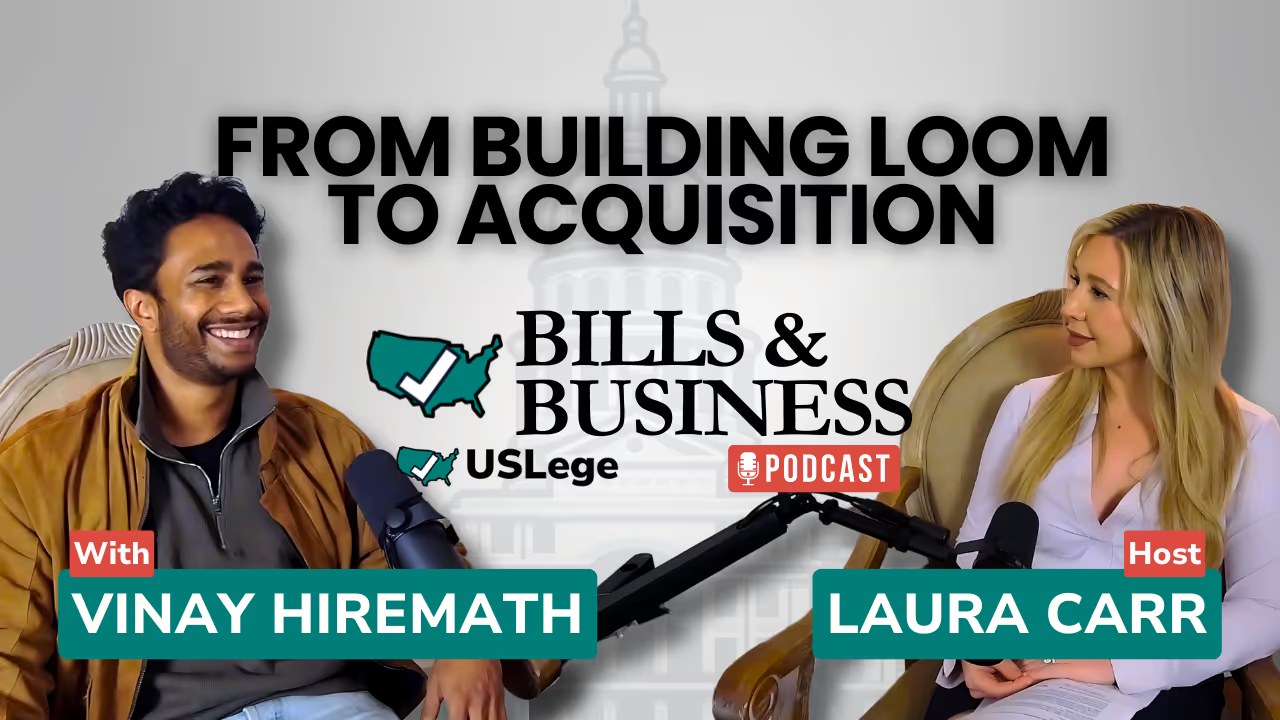
#21 - Vinay Hiremath: From Building Loom to Acquisition & Life Beyond Startups
Welcome to Episode #21 of Bills & Business! In this episode, Laura Carr sits down with Vinay Hiremath, co-founder of Loom, the video messaging tool that grew to 14 million users and sold for nearly a billion dollars. But what happens after that level of success?
Vinay shares his journey beyond the startup world—turning down a $60 million retention offer, exploring robotics and government work, and even venturing to the Himalayas in search of new purpose. He reflects on the challenges of building and scaling a business, the decision to sell Loom to Atlassian, and what founders don’t realize about acquisitions.
Join Laura Carr, Co-Founder of USLege, for an insightful conversation on entrepreneurship, resilience, and redefining success beyond financial milestones.
Don’t forget to subscribe to Bills & Business on Apple Podcasts, Spotify, and YouTube for more in-depth conversations on the key issues impacting business and policy.
📲 Follow Laura Carr
🐦 Twitter: @Laura_USLege https://x.com/Laura_USLege
💼 LinkedIn: https://www.linkedin.com/in/laurauslege/
📸 Instagram: https://www.instagram.com/thereallauracarr/
🛍️ ShopMy: https://shopmy.us/shop/lauraluise?Section_title=latest-finds&tab=collections
✍️ Substack: https://lauraluise.substack.com/
🔗 Links: https://lauraluise.carrd.co/
📲 Follow USLege
🌐 Website: https://www.uslege.ai/
✨ Instagram: https://www.instagram.com/uslege.ai/
📘 Facebook: https://www.facebook.com/USLegeai
🐦 Twitter: @USLege_ai https://x.com/USLege_ai
💼 LinkedIn: https://www.linkedin.com/company/uslege-ai/
🎧 Subscribe to Bills & Business
▶️ YouTube: https://www.youtube.com/@BillsandBusiness
🎵 Spotify: Bills and Business by USLege https://open.spotify.com/show/22ZWg9VVb2AEGqyV14osNi?si=effe3795f8414171
🍎 Apple Podcasts: Bills and Business by USLege https://podcasts.apple.com/ph/podcast/bills-and-business-by-uslege/id1781059329
🎥 TikTok: https://www.tiktok.com/@billsandbusiness
🎬 Produced by USLege
📞 Want to see USLege in action? Schedule a demo today! https://www.uslege.ai/demo
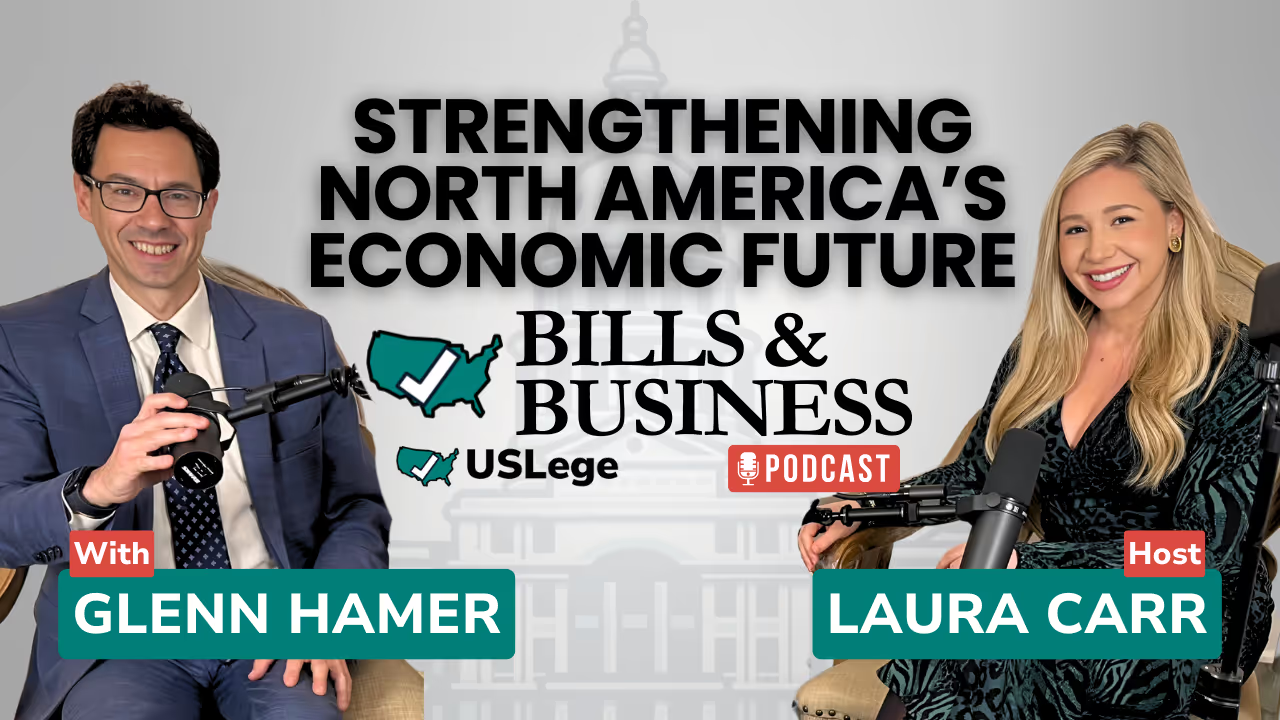
#20 - Glenn Hamer: How Texas Leads Trade & Strengthens North America's Economy
Welcome to Episode #20 of Bills & Business. In this episode, host Laura Carr sits down with Glenn Hamer, CEO of the Texas Association of Business, to explore the vital role Texas plays in driving international trade across North America.
Glenn shares insights into the Texas Leads Trade Coalition, a growing alliance of over 35 stakeholders working to support trilateral trade between the U.S., Mexico, and Canada. Together, they discuss how Texas has maintained its status as the nation’s top exporting state, the industries most impacted by global trade, and the jobs directly supported by international partnerships.
From policy challenges like tariffs and infrastructure hurdles to success stories of businesses overcoming trade obstacles, Glenn highlights the importance of strong advocacy to keep Texas competitive on the global stage. He also offers a look ahead at legislative priorities, upcoming USMCA discussions, and how everyday Texans can support pro-trade policies.
Join Laura Carr, Co-Founder of USLege, for an in-depth conversation on the future of trade, economic growth, and Texas' leadership in shaping North America's economic success.
Don’t forget to subscribe to Bills & Business on Apple Podcasts, Spotify, and YouTube for more episodes covering the key policies impacting Texas.
📲 Follow Laura Carr
🐦 Twitter: @Laura_USLege https://x.com/Laura_USLege
💼 LinkedIn: https://www.linkedin.com/in/laurauslege/
📸 Instagram: https://www.instagram.com/thereallauracarr/
🛍️ ShopMy: https://shopmy.us/shop/lauraluise?Section_title=latest-finds&tab=collections
✍️ Substack: https://lauraluise.substack.com/
🔗 Links: https://lauraluise.carrd.co/
📲 Follow USLege
🌐 Website: https://www.uslege.ai/
✨ Instagram: https://www.instagram.com/uslege.ai/
📘 Facebook: https://www.facebook.com/USLegeai
🐦 Twitter: @USLege_ai https://x.com/USLege_ai
💼 LinkedIn: https://www.linkedin.com/company/uslege-ai/
🎧 Subscribe to Bills & Business
▶️ YouTube: https://www.youtube.com/@BillsandBusiness
🎵 Spotify: Bills and Business by USLege https://open.spotify.com/show/22ZWg9VVb2AEGqyV14osNi?si=effe3795f8414171
🍎 Apple Podcasts: Bills and Business by USLege https://podcasts.apple.com/ph/podcast/bills-and-business-by-uslege/id1781059329
🎥 TikTok: https://www.tiktok.com/@billsandbusiness
🎬 Produced by USLege
📞 Want to see USLege in action? Schedule a demo today! https://www.uslege.ai/demo
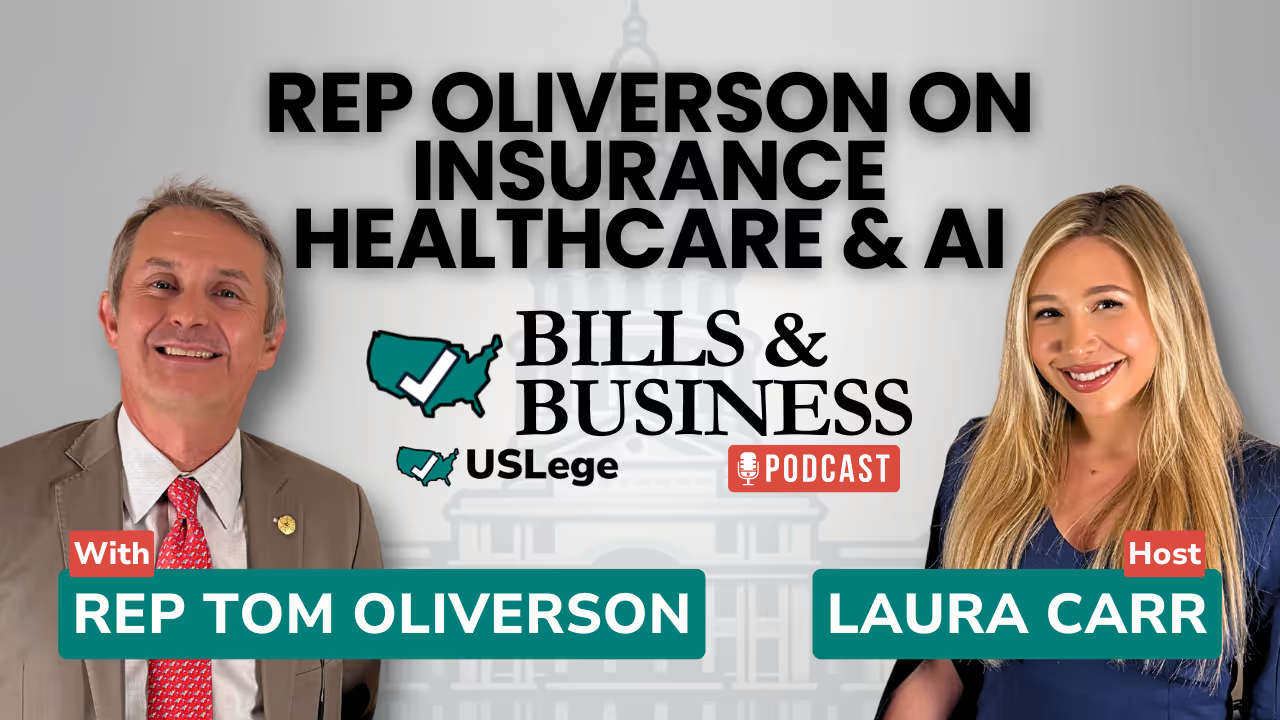
#19 - Rep. Tom Oliverson: Healthcare, Insurance & AI in Texas
Welcome to Episode #19 of Bills & Business. In this episode, Laura Carr sits down with Representative Tom Oliverson, Chairman of the House Republican Caucus and a practicing anesthesiologist, to discuss the intersection of healthcare, insurance, and AI in Texas policy.
Rep. Oliverson shares his journey from medicine to politics, his legislative priorities, and his insights on health care reform, insurance regulations, and the role of technology in modernizing the system. He also discusses House Bill 2002, which allows cash payments to count toward deductibles, and the broader implications for patient care and affordability.
Join Laura Carr, Co-Founder of USLege, for an in-depth conversation on the future of Texas healthcare, leadership in the legislature, and how AI is shaping policy discussions.
🔔 Don’t forget to subscribe to Bills & Business on Apple Podcasts, Spotify, and YouTube for more expert insights on Texas legislation and business!
📲 Follow Laura Carr
🐦 Twitter: @Laura_USLege https://x.com/Laura_USLege
💼 LinkedIn: https://www.linkedin.com/in/laurauslege/
📸 Instagram: https://www.instagram.com/thereallauracarr/
🛍️ ShopMy: https://shopmy.us/shop/lauraluise?Section_title=latest-finds&tab=collections
✍️ Substack: https://lauraluise.substack.com/
🔗 Links: https://lauraluise.carrd.co/
📲 Follow USLege
✨ Instagram: https://www.instagram.com/uslege.ai/
📘 Facebook: https://www.facebook.com/USLegeai
🐦 Twitter: @USLege_ai https://x.com/USLege_ai
💼 LinkedIn: https://www.linkedin.com/company/uslege-ai/
🎧 Subscribe to Bills & Business
🌐 Website: [www.uslege.ai](https://www.uslege.ai/)
▶️ YouTube: https://www.youtube.com/@BillsandBusiness
🎵 Spotify: Bills and Business by USLege https://open.spotify.com/show/22ZWg9VVb2AEGqyV14osNi?si=effe3795f8414171
🍎 Apple Podcasts: Bills and Business by USLege https://podcasts.apple.com/ph/podcast/bills-and-business-by-uslege/id1781059329
🎥 TikTok: https://www.tiktok.com/ @BillsandBusiness
🎬 Produced by USLege
📞 Want to see USLege in action? Schedule a demo today! https://www.uslege.ai/demo
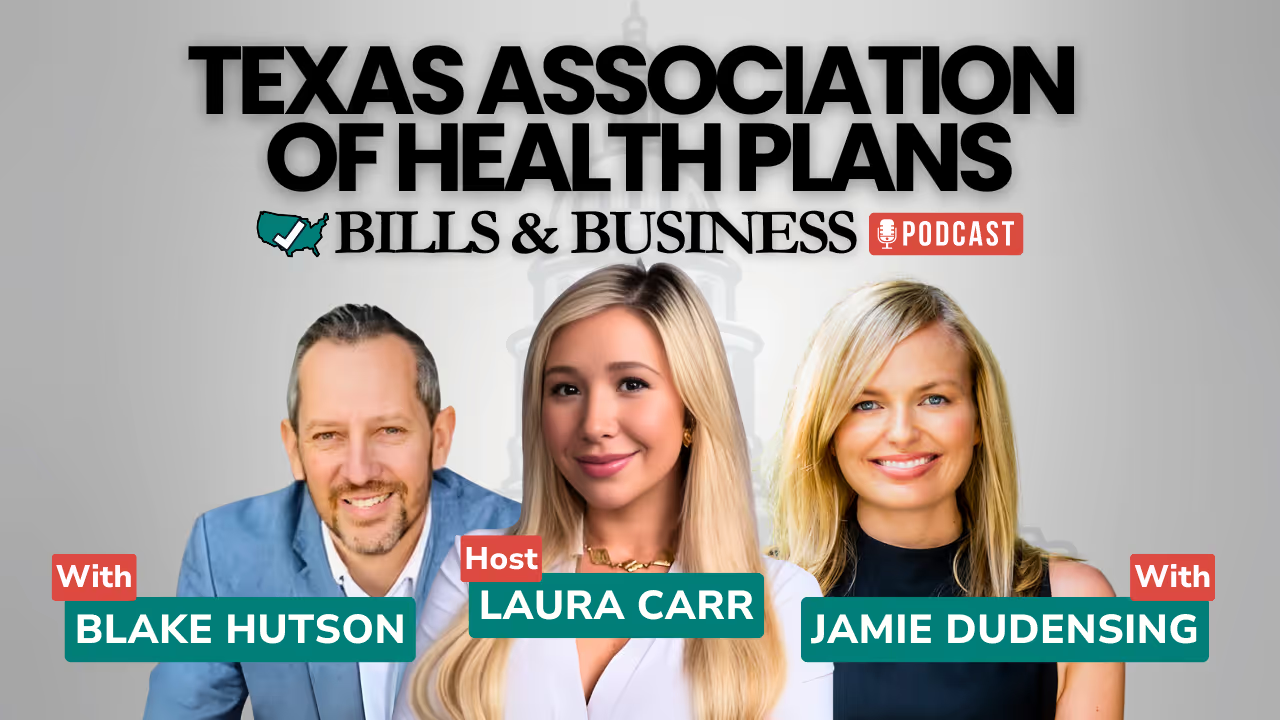
#18 - Jamie Dudensing & Blake Hutson: Texas Association of Health Plans
Welcome to Episode #18 of Bills & Business: TXLege News! In this episode, we’re joined by Jamie Dudensing, CEO of the Texas Association of Health Plans, to discuss the future of health care access, affordability, and policy in Texas.
With a background in both nursing and public policy, Jamie brings a unique perspective on Medicaid mental health coverage, employer-sponsored insurance, and the challenges facing the individual market. She shares insights on reducing mandates, improving Texas Medicaid, and fostering a healthier, more affordable health care system for Texans.
Join Laura Carr, Co-Founder of USLege, for an engaging discussion on the policies and strategies shaping Texas health care.
📌 Don’t forget to subscribe to Bills & Business on Apple Podcasts, Spotify, and YouTube for more in-depth conversations on Texas policy and business.
📲 Follow Laura Carr
🐦 Twitter: @Laura_USLege https://x.com/Laura_USLege
💼 LinkedIn: https://www.linkedin.com/in/laurauslege/
📸 Instagram: https://www.instagram.com/thereallauracarr/
🛍️ ShopMy: https://shopmy.us/shop/lauraluise?Section_title=latest-finds&tab=collections
✍️ Substack: https://lauraluise.substack.com/
🔗 Links: https://lauraluise.carrd.co/
📲 Follow USLege
✨ Instagram: https://www.instagram.com/uslege.ai/
📘 Facebook: https://www.facebook.com/USLegeai
🐦 Twitter: @USLege_ai https://x.com/USLege_ai
💼 LinkedIn: https://www.linkedin.com/company/uslege-ai/
🎧 Subscribe to Bills & Business
🌐 Website: [www.uslege.ai](https://www.uslege.ai/)
▶️ YouTube: https://www.youtube.com/@BillsandBusiness
🎵 Spotify: Bills and Business by USLege https://open.spotify.com/show/22ZWg9VVb2AEGqyV14osNi?si=effe3795f8414171
🍎 Apple Podcasts: Bills and Business by USLege https://podcasts.apple.com/ph/podcast/bills-and-business-by-uslege/id1781059329
🎥 TikTok: https://www.tiktok.com/ @BillsandBusiness
🎬 Produced by USLege
📞 Want to see USLege in action? Schedule a demo today! https://www.uslege.ai/demo
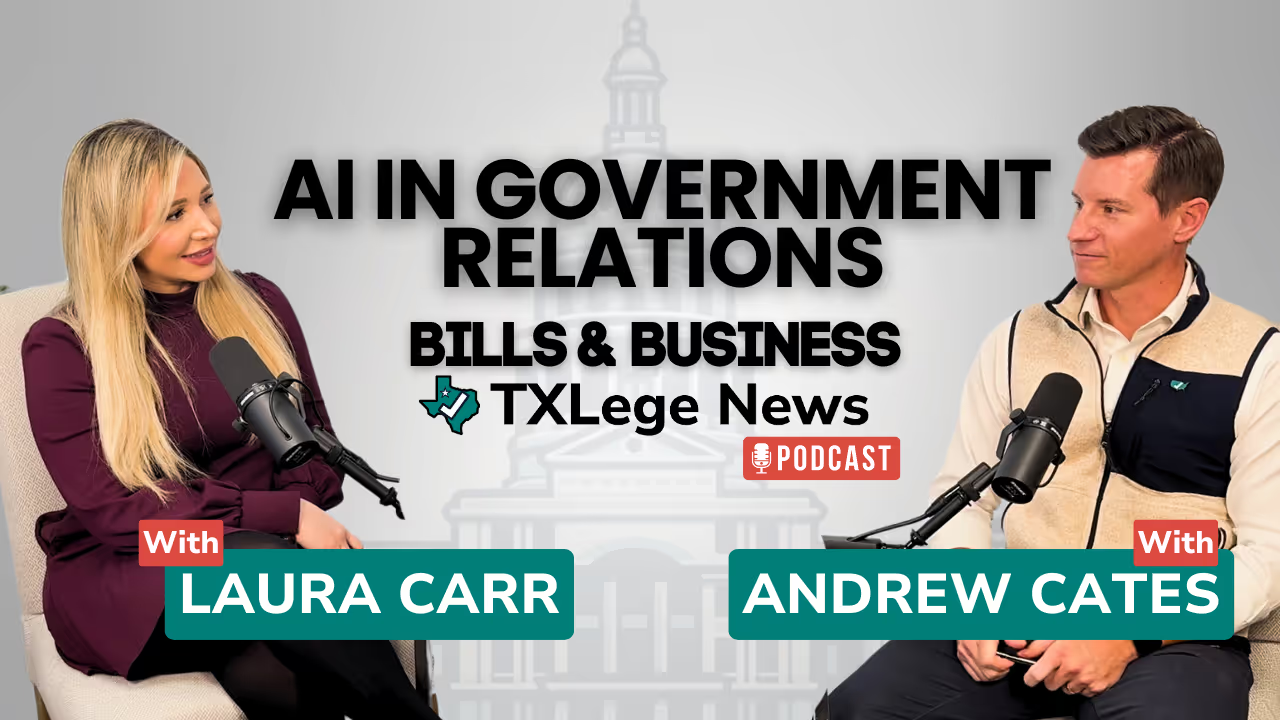
#17 - Andy Cates: AI in Government Relations
Welcome to Episode #17 of Bills & Business: TXLege News! In this episode, we’re joined by Andy Cates, owner of Cates Legal Group PLLC, outside General Counsel for USLege, and a pioneer in legislative and campaign law.
Andy shares insights from his extensive career, including his authorship of Texas Ethics Laws Annotated and his leadership in creating Texas’ first legal specialization in campaign law. Together with host Laura Carr, Co-Founder of USLege, Andy explores the transformative role of AI in government relations, discussing its potential to streamline lobbying efforts, enhance transparency, and reshape the future of advocacy.
Topics covered include:
✨ Key moments in Andy’s career in campaign law and government relations
✨ The integration of AI tools in legislative processes and ethical practices
✨ Current challenges and trends in political compliance and advocacy
✨ Advice for young professionals and Andy’s vision for the future of AI in advocacy
Join Laura Carr for this engaging conversation on the intersection of technology, ethics, and government affairs.
Don’t forget to subscribe to Bills & Business on Apple Podcasts, Spotify, and YouTube for more in-depth conversations on the key issues shaping Texas today and tomorrow.
📲 Follow Laura Carr
🐦 Twitter: @Laura_USLege https://x.com/Laura_USLege
💼 LinkedIn: https://www.linkedin.com/in/laurauslege/
📸 Instagram: https://www.instagram.com/thereallauracarr/
🛍️ ShopMy: https://shopmy.us/shop/lauraluise?Section_title=latest-finds&tab=collections
✍️ Substack: https://lauraluise.substack.com/
🔗 Links: https://lauraluise.carrd.co/
📲 Follow USLege
✨ Instagram: https://www.instagram.com/uslege.ai/
📘 Facebook: https://www.facebook.com/USLegeai
🐦 Twitter: @USLege_ai https://x.com/USLege_ai
💼 LinkedIn: https://www.linkedin.com/company/uslege-ai/
🎧 Subscribe to Bills & Business
🌐 Website: [www.uslege.ai](https://www.uslege.ai/)
▶️ YouTube: https://www.youtube.com/@BillsandBusiness
🎵 Spotify: Bills and Business by USLege https://open.spotify.com/show/22ZWg9VVb2AEGqyV14osNi?si=effe3795f8414171
🍎 Apple Podcasts: Bills and Business by USLege https://podcasts.apple.com/ph/podcast/bills-and-business-by-uslege/id1781059329
🎥 TikTok: https://www.tiktok.com/ @BillsandBusiness
🎬 Produced by USLege
📞 Want to see USLege in action? Schedule a demo today! https://www.uslege.ai/demo
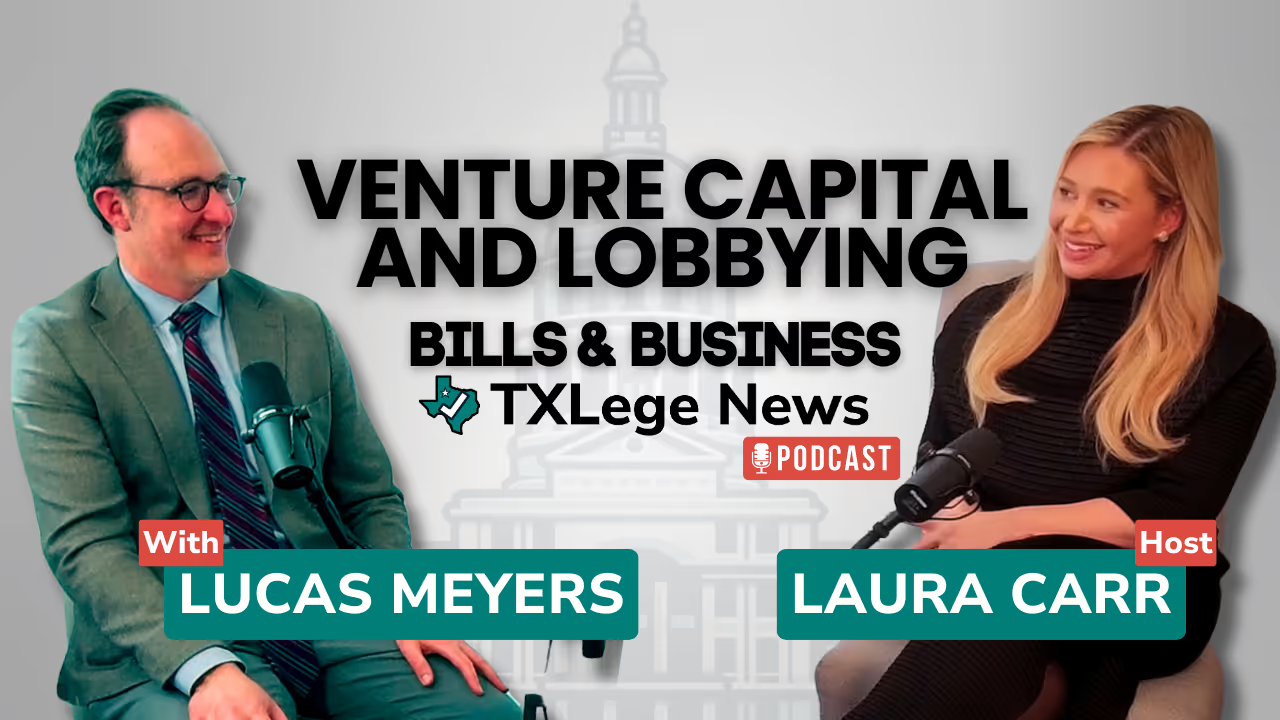
#16 - Lucas Meyers: Venture Capital and Lobbying in Texas
Welcome to Episode #16 of Bills & Business: TXLege News! In this engaging installment, host Laura Carr, Co-Founder of USLege, sits down with Texas lobbyist Lucas Meyers, Managing Principal of Governmental Affairs LLC. Lucas brings decades of experience from the Texas Senate and House, navigating complex policy areas from telecommunications to taxes and oil and gas, while even sharing a light-hearted nod to his interest in DJing and rugby.
In this episode, Lucas demystifies lobbying by addressing common misconceptions and explaining its constitutional protections as a First Amendment right. Listeners gain strategic insights into how effective lobbying can drive economic benefits, support businesses of all sizes, and influence policy outcomes across Texas and beyond. Join us as Lucas shares his journey and expert advice on building trust, leveraging a first-mover advantage, and crafting effective governmental relations strategies.
Don’t forget to subscribe to Bills & Business on Apple Podcasts, Spotify, and YouTube for more in-depth discussions at the intersection of business and legislative affairs.
📲 Follow Laura Carr
🐦 Twitter: @Laura_USLege https://x.com/Laura_USLege
💼 LinkedIn: https://www.linkedin.com/in/laurauslege/
📸 Instagram: https://www.instagram.com/thereallauracarr/
🛍️ ShopMy: https://shopmy.us/shop/lauraluise?Section_title=latest-finds&tab=collections
✍️ Substack: https://lauraluise.substack.com/
🔗 Links: https://lauraluise.carrd.co/
📲 Follow USLege
✨ Instagram: https://www.instagram.com/uslege.ai/
📘 Facebook: https://www.facebook.com/USLegeai
🐦 Twitter: @USLege_ai https://x.com/USLege_ai
💼 LinkedIn: https://www.linkedin.com/company/uslege-ai/
🎧 Subscribe to Bills & Business
🌐 Website: [www.uslege.ai](https://www.uslege.ai/)
▶️ YouTube: https://www.youtube.com/@BillsandBusiness
🎵 Spotify: Bills and Business by USLege https://open.spotify.com/show/22ZWg9VVb2AEGqyV14osNi?si=effe3795f8414171
🍎 Apple Podcasts: Bills and Business by USLege https://podcasts.apple.com/ph/podcast/bills-and-business-by-uslege/id1781059329
🎥 TikTok: https://www.tiktok.com/ @BillsandBusiness
🎬 Produced by USLege
📞 Want to see USLege in action? Schedule a demo today! https://www.uslege.ai/demo
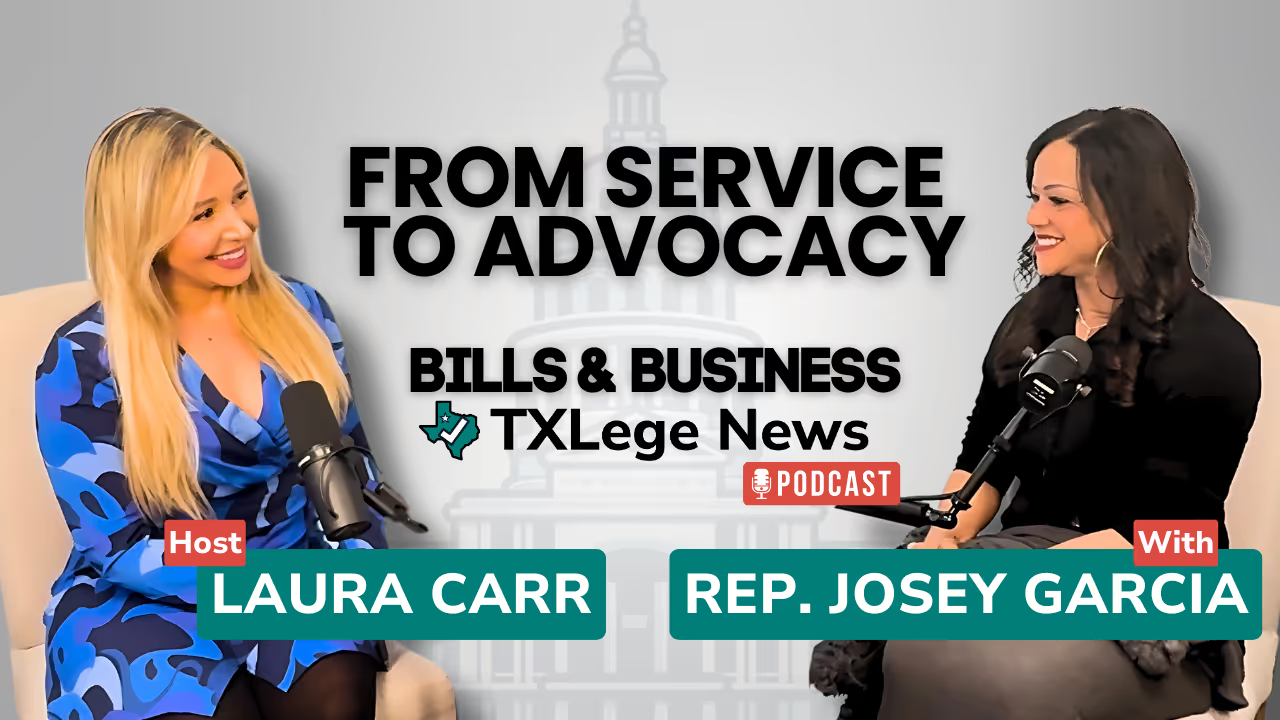
#15 - Rep. Josey Garcia: From Service to Advocacy in the Texas Legislature
Welcome to Episode #15 of Bills & Business: TXLege News! In this episode, Laura Carr sits down with Representative Josey Garcia, the first woman active-duty veteran to serve in the Texas House. Representing House District 124 in West San Antonio, Rep. Garcia’s journey from foster care to military service and now public office highlights resilience, leadership, and a deep commitment to community advocacy.
Rep. Garcia shares insights on her legislative priorities, including veterans’ issues, affordable housing, and foster care reform. She also discusses her role on the Defense & Veterans’ Affairs and Culture, Recreation & Tourism Committees, as well as her efforts to address economic challenges in West San Antonio.
Tune in to hear Rep. Garcia’s vision for Texas, her approach to bipartisan collaboration, and her advice for young Texans looking to make a difference.
🔹 Don’t forget to subscribe to Bills & Business on Apple Podcasts, Spotify, and YouTube for more in-depth discussions on Texas legislation and business.
📲 Follow Laura Carr
🐦 Twitter: @Laura_USLege https://x.com/Laura_USLege
💼 LinkedIn: https://www.linkedin.com/in/laurauslege/
📸 Instagram: https://www.instagram.com/thereallauracarr/
🛍️ ShopMy: https://shopmy.us/shop/lauraluise?Section_title=latest-finds&tab=collections
✍️ Substack: https://lauraluise.substack.com/
🔗 Links: https://lauraluise.carrd.co/
📲 Follow USLege
✨ Instagram: https://www.instagram.com/uslege.ai/
📘 Facebook: https://www.facebook.com/USLegeai
🐦 Twitter: @USLege_ai https://x.com/USLege_ai
💼 LinkedIn: https://www.linkedin.com/company/uslege-ai/
🎧 Subscribe to Bills & Business
🌐 Website: [www.uslege.ai](https://www.uslege.ai/)
▶️ YouTube: https://www.youtube.com/@BillsandBusiness
🎵 Spotify: Bills and Business by USLege https://open.spotify.com/show/22ZWg9VVb2AEGqyV14osNi?si=effe3795f8414171
🍎 Apple Podcasts: Bills and Business by USLege https://podcasts.apple.com/ph/podcast/bills-and-business-by-uslege/id1781059329
🎥 TikTok: https://www.tiktok.com/ @BillsandBusiness
🎬 Produced by USLege
📞 Want to see USLege in action? Schedule a demo today! https://www.uslege.ai/demo
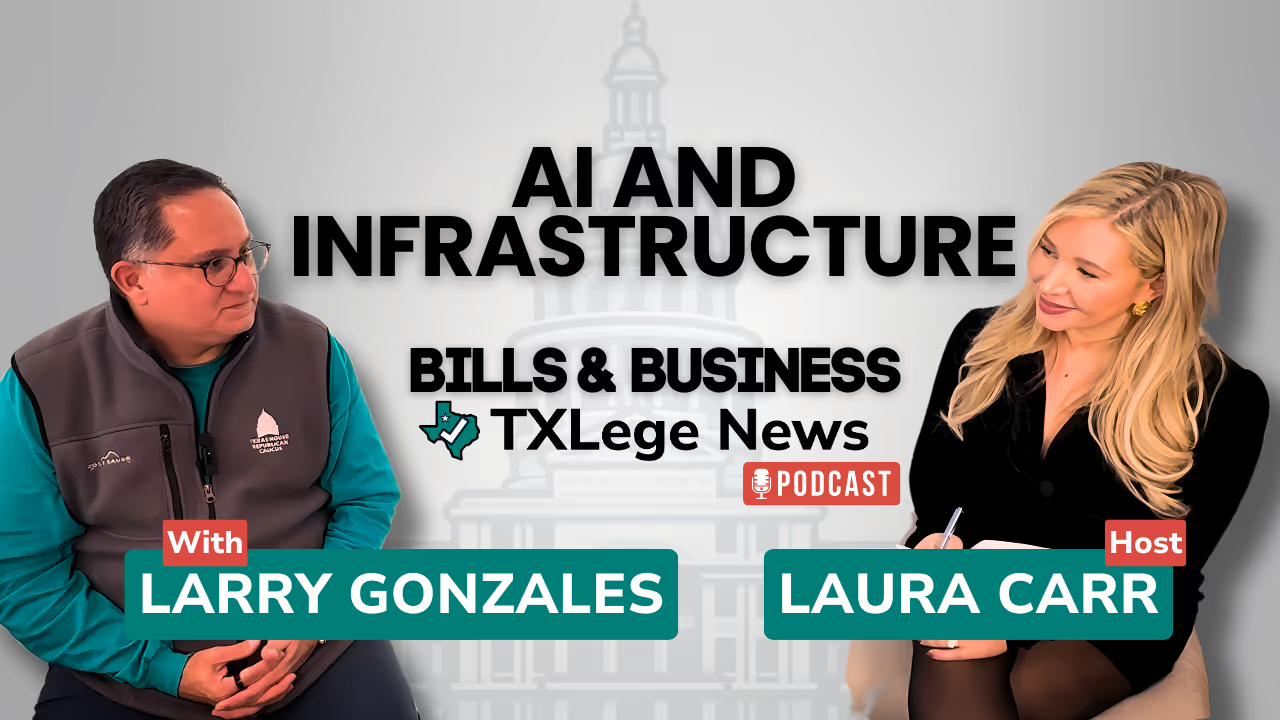
#14 - Larry Gonzales: AI & Infrastructure Challenges Shaping Texas
Welcome to Episode #14 of Bills & Business: TXLege News! In this episode, Laura Carr sits down with The Honorable Larry Gonzales, former member of the Texas House of Representatives, to explore how artificial intelligence is transforming Texas’s infrastructure and economy.
Larry shares his expertise on the challenges AI presents, from increased energy demands to the need for water infrastructure optimization. He discusses the balance between fostering AI innovation and addressing sustainability, highlighting key lessons from events like Winter Storm Uri and their impact on grid resilience.
The conversation also dives into the economic opportunities AI offers, including the industries poised to benefit most and the legislative efforts needed to ensure responsible growth.
Join Laura and Larry for this insightful discussion on the future of AI and infrastructure in Texas.
Don’t forget to subscribe to Bills & Business on Apple Podcast, Spotify, and YouTube for more in-depth conversations about the issues shaping Texas today.
📲 Follow Laura Carr
🐦 Twitter: @Laura_USLege https://x.com/Laura_USLege
💼 LinkedIn: https://www.linkedin.com/in/laurauslege/
📸 Instagram: https://www.instagram.com/thereallauracarr/
🛍️ ShopMy: https://shopmy.us/shop/lauraluise?Section_title=latest-finds&tab=collections
✍️ Substack: https://lauraluise.substack.com/
🔗 Links: https://lauraluise.carrd.co/
📲 Follow USLege
✨ Instagram: https://www.instagram.com/uslege.ai/
📘 Facebook: https://www.facebook.com/USLegeai
🐦 Twitter: @USLege_ai https://x.com/USLege_ai
💼 LinkedIn: https://www.linkedin.com/company/uslege-ai/
🎧 Subscribe to Bills & Business
🌐 Website: [www.uslege.ai](https://www.uslege.ai/)
▶️ YouTube: https://www.youtube.com/@BillsandBusiness
🎵 Spotify: Bills and Business by USLege https://open.spotify.com/show/22ZWg9VVb2AEGqyV14osNi?si=effe3795f8414171
🍎 Apple Podcasts: Bills and Business by USLege https://podcasts.apple.com/ph/podcast/bills-and-business-by-uslege/id1781059329
🎥 TikTok: https://www.tiktok.com/ @BillsandBusiness
🎬 Produced by USLege
📞 Want to see USLege in action? Schedule a demo today! https://www.uslege.ai/demo
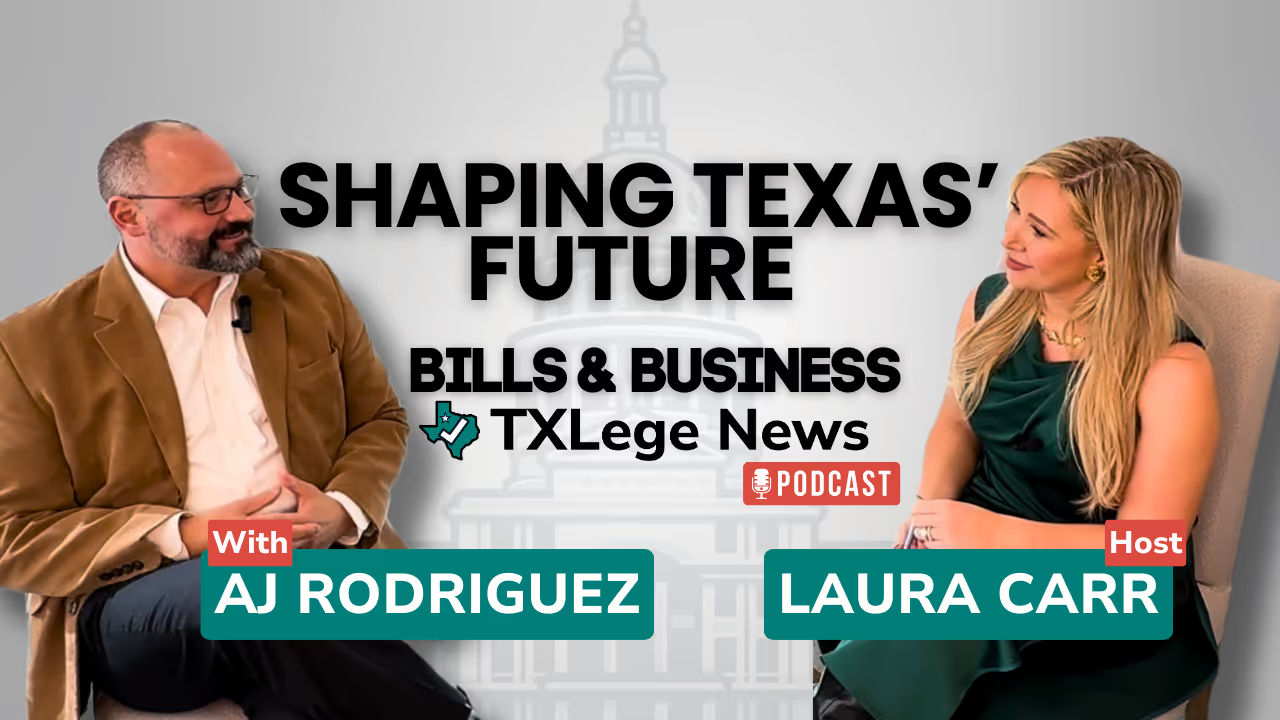
#13 AJ Rodriguez: Texas 2036’s Vision for Texas’ Future
Welcome to Episode #13 of Bills & Business: TXLege News! In this episode, we’re joined by AJ Rodriguez, Executive Vice President of Texas 2036, a think tank focused on shaping Texas' long-term prosperity. AJ discusses Texas 2036’s mission to build a strong foundation for the state as it approaches its bicentennial in 2036, emphasizing non-partisan policies across education, infrastructure, health care, and more.
AJ shares his insights on the legislative priorities that will drive the future of Texas, including workforce development, health care affordability, housing, and infrastructure investments. From addressing the pressing needs in Texas' education system to advancing sustainable energy strategies, AJ outlines how Texas 2036 is collaborating across the aisle to position the state for continued growth and innovation.
Join Laura Carr, Co-Founder of USLege, for this in-depth conversation on how Texas can continue to lead the nation in business, innovation, and quality of life for all its residents. Don’t forget to subscribe to Bills & Business on Apple podcast, Spotify, and YouTube for more in-depth conversations on the key issues impacting Texas.
📲 Follow Laura Carr
🐦 Twitter: @Laura_USLege https://x.com/Laura_USLege
💼 LinkedIn: https://www.linkedin.com/in/laurauslege/
📸 Instagram: https://www.instagram.com/thereallauracarr/
🛍️ ShopMy: https://shopmy.us/shop/lauraluise?Section_title=latest-finds&tab=collections
✍️ Substack: https://lauraluise.substack.com/
🔗 Links: https://lauraluise.carrd.co/
📲 Follow USLege
✨ Instagram: https://www.instagram.com/uslege.ai/
📘 Facebook: https://www.facebook.com/USLegeai
🐦 Twitter: @USLege_ai https://x.com/USLege_ai
💼 LinkedIn: https://www.linkedin.com/company/uslege-ai/
🎧 Subscribe to Bills & Business
🌐 Website: [www.uslege.ai](https://www.uslege.ai/)
▶️ YouTube: https://www.youtube.com/@BillsandBusiness
🎵 Spotify: Bills and Business by USLege https://open.spotify.com/show/22ZWg9VVb2AEGqyV14osNi?si=effe3795f8414171
🍎 Apple Podcasts: Bills and Business by USLege https://podcasts.apple.com/ph/podcast/bills-and-business-by-uslege/id1781059329
🎥 TikTok: https://www.tiktok.com/ @BillsandBusiness
🎬 Produced by USLege
📞 Want to see USLege in action? Schedule a demo today! https://www.uslege.ai/demo
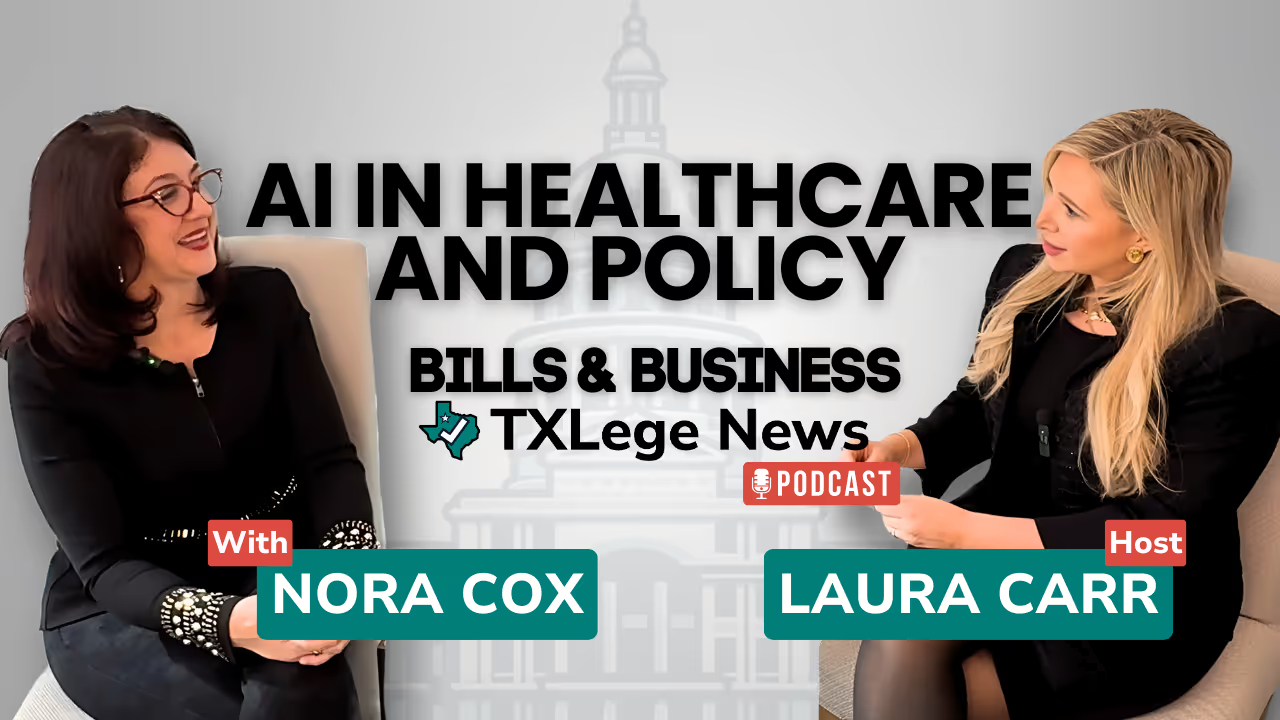
#12 - Nora Cox: AI in Healthcare & Policy
Welcome to Episode #12 of Bills & Business: Texas Legislative News! In this episode, host Laura Carr sits down with Nora Cox, CEO of the Texas e-Health Alliance and a leading advocate for healthcare modernization through technology. With a rich background in tech and policy, Nora brings a unique perspective to the intersection of healthcare innovation and legislative action.
Nora shares her insights on the critical role AI plays in healthcare today, addressing patient privacy concerns, telemedicine advancements, and how legislative decisions shape the future of healthcare delivery. The conversation also touches on the importance of stakeholder engagement in AI discussions, the evolving regulatory landscape, and the balance between innovation and governance.
Join us as Nora discusses her testimony on AI’s impact on healthcare professionals, the expansion of telemedicine during the COVID-19 pandemic, and her vision for the future of healthcare technology. This episode is packed with valuable insights for businesses, lawmakers, and consumers alike.
Don’t forget to subscribe to Bills & Business on Apple Podcasts, Spotify, and YouTube for more in-depth conversations on the key issues impacting Texas and beyond!
📲 Follow Laura Carr
🐦 Twitter: @Laura_USLege https://x.com/Laura_USLege
💼 LinkedIn: https://www.linkedin.com/in/laurauslege/
📸 Instagram: https://www.instagram.com/thereallauracarr/
🛍️ ShopMy: https://shopmy.us/shop/lauraluise?Section_title=latest-finds&tab=collections
✍️ Substack: https://lauraluise.substack.com/
🔗 Links: https://lauraluise.carrd.co/
📲 Follow USLege
✨ Instagram: https://www.instagram.com/uslege.ai/
📘 Facebook: https://www.facebook.com/USLegeai
🐦 Twitter: @USLege_ai https://x.com/USLege_ai
💼 LinkedIn: https://www.linkedin.com/company/uslege-ai/
🎧 Subscribe to Bills & Business
🌐 Website: [www.uslege.ai](https://www.uslege.ai/)
▶️ YouTube: https://www.youtube.com/@BillsandBusiness
🎵 Spotify: Bills and Business by USLege https://open.spotify.com/show/22ZWg9VVb2AEGqyV14osNi?si=effe3795f8414171
🍎 Apple Podcasts: Bills and Business by USLege https://podcasts.apple.com/ph/podcast/bills-and-business-by-uslege/id1781059329
🎥 TikTok: https://www.tiktok.com/ @BillsandBusiness
🎬 Produced by USLege
📞 Want to see USLege in action? Schedule a demo today! https://www.uslege.ai/demo
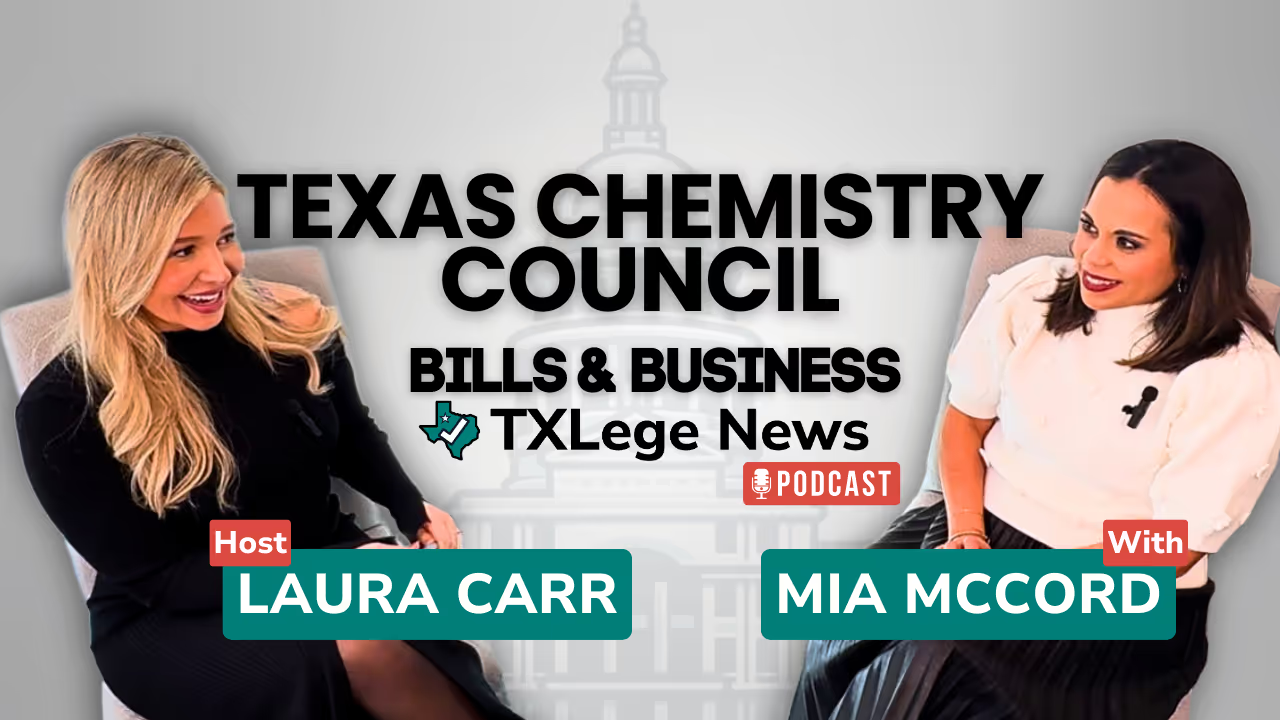
#11 - Mia McCord: Texas Chemistry Council
Welcome to Episode #11 of Bills & Business: TXLege News! In this episode, we’re joined by Mia McCord, Vice President of Government Affairs at the Texas Chemistry Council. With nearly two decades of experience in Texas public policy, political campaigns, and government relations, Mia shares her journey from serving in the Texas Legislature to leading legislative efforts for the chemical industry at TCC.
Mia discusses the pivotal role of the chemical industry in Texas’ economy, her goals for TCC’s advocacy, and the importance of fostering bipartisan relationships to address critical legislative priorities. As the first Hispanic and first woman President of the Texas Conservative Coalition Research Institute, Mia’s leadership story is both inspiring and impactful.
Join Laura Carr, Co-Founder of USLege, for an engaging conversation about legislative advocacy, community leadership, and the future of Texas business.
Don’t forget to subscribe to Bills & Business on Apple Podcasts, Spotify, and YouTube for more in-depth conversations on the key issues impacting Texas.
📲 Follow Laura Carr
🐦 Twitter: @Laura_USLege https://x.com/Laura_USLege
💼 LinkedIn: https://www.linkedin.com/in/laurauslege/
📸 Instagram: https://www.instagram.com/thereallauracarr/
🛍️ ShopMy: https://shopmy.us/shop/lauraluise?Section_title=latest-finds&tab=collections
✍️ Substack: https://lauraluise.substack.com/
🔗 Links: https://lauraluise.carrd.co/
📲 Follow USLege
✨ Instagram: https://www.instagram.com/uslege.ai/
📘 Facebook: https://www.facebook.com/USLegeai
🐦 Twitter: @USLege_ai https://x.com/USLege_ai
💼 LinkedIn: https://www.linkedin.com/company/uslege-ai/
🎧 Subscribe to Bills & Business
🌐 Website: [www.uslege.ai](https://www.uslege.ai/)
▶️ YouTube: https://www.youtube.com/@BillsandBusiness
🎵 Spotify: Bills and Business by USLege https://open.spotify.com/show/22ZWg9VVb2AEGqyV14osNi?si=effe3795f8414171
🍎 Apple Podcasts: Bills and Business by USLege https://podcasts.apple.com/ph/podcast/bills-and-business-by-uslege/id1781059329
🎥 TikTok: https://www.tiktok.com/ @BillsandBusiness
🎬 Produced by USLege
📞 Want to see USLege in action? Schedule a demo today! https://www.uslege.ai/demo
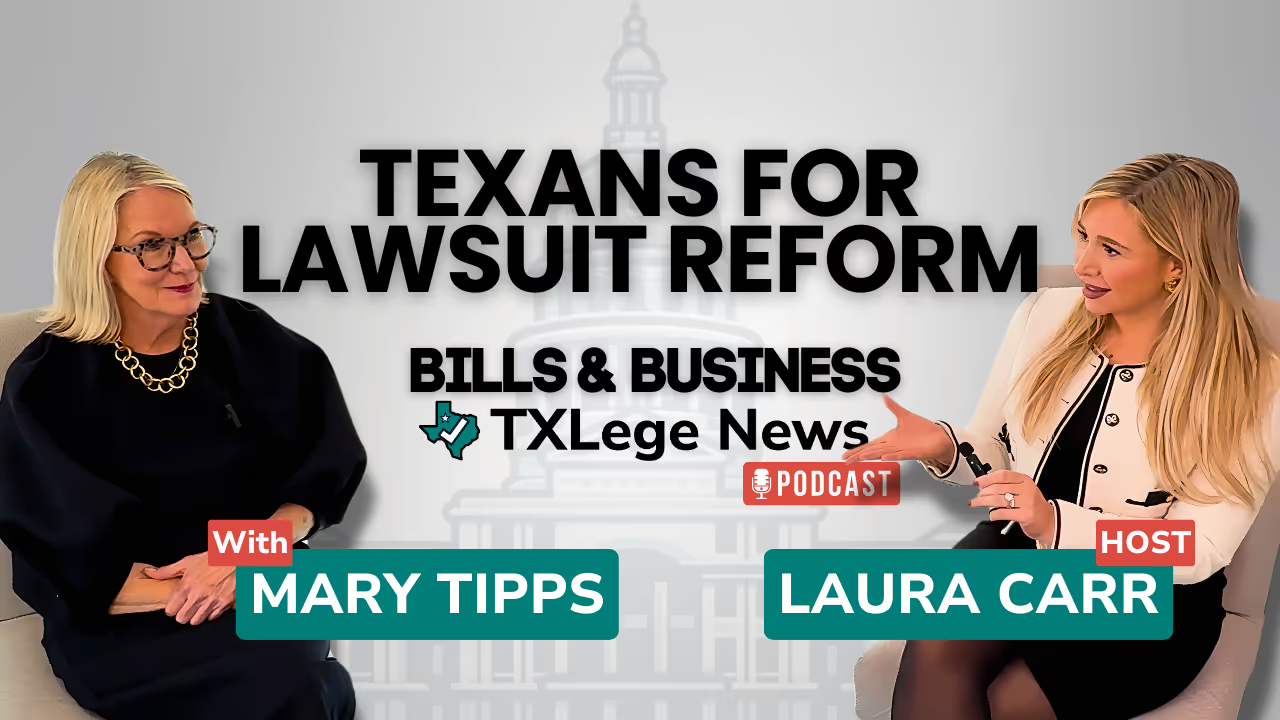
#10 - Mary Tipps: Texans For Lawsuit Reform
Welcome to Episode #10 of Bills & Business: TXLege News! This episode features Mary Tipps, Executive Director of Texans for Lawsuit Reform (TLR), who has been at the forefront of legal reform and advocacy in Texas for over two decades.
Join host Laura Carr, Co-Founder of USLege, as she delves into Mary’s journey with TLR, the organization’s transformative impact on Texas’ legal system, and the role of tort reform in bolstering the state’s economy. Mary shares insights into TLR’s current legislative priorities, including combating “nuclear verdicts” and building coalitions like the Lone Star Economic Alliance to protect Texas’ business-friendly environment.
From attracting businesses and creating jobs to ensuring justice remains balanced and fair, TLR’s work has shaped Texas into a beacon for economic growth. Tune in for a compelling conversation about advocacy, reform, and the future of legal policy in the Lone Star State.
Don’t forget to subscribe to Bills & Business on Apple Podcasts, Spotify, and YouTube for more in-depth discussions about the issues shaping Texas.
📲 Follow Laura Carr
🐦 Twitter: @Laura_USLege https://x.com/Laura_USLege
💼 LinkedIn: https://www.linkedin.com/in/laurauslege/
📸 Instagram: https://www.instagram.com/thereallauracarr/
🛍️ ShopMy: https://shopmy.us/shop/lauraluise?Section_title=latest-finds&tab=collections
✍️ Substack: https://lauraluise.substack.com/
🔗 Links: https://lauraluise.carrd.co/
📲 Follow USLege
✨ Instagram: https://www.instagram.com/uslege.ai/
📘 Facebook: https://www.facebook.com/USLegeai
🐦 Twitter: @USLege_ai https://x.com/USLege_ai
💼 LinkedIn: https://www.linkedin.com/company/uslege-ai/
🎧 Subscribe to Bills & Business
🌐 Website: https://www.uslege.ai/
▶️ YouTube: https://www.youtube.com/@BillsandBusiness
🎵 Spotify: https://open.spotify.com/show/22ZWg9VVb2AEGqyV14osNi?si=effe3795f8414171
🍎 Apple Podcasts: https://podcasts.apple.com/ph/podcast/bills-and-business-by-uslege/id1781059329
🎥 TikTok: https://www.tiktok.com/@billsandbusiness
🎬 Produced by USLege
📞 Want to see USLege in action? Schedule a demo today! https://www.uslege.ai/demo
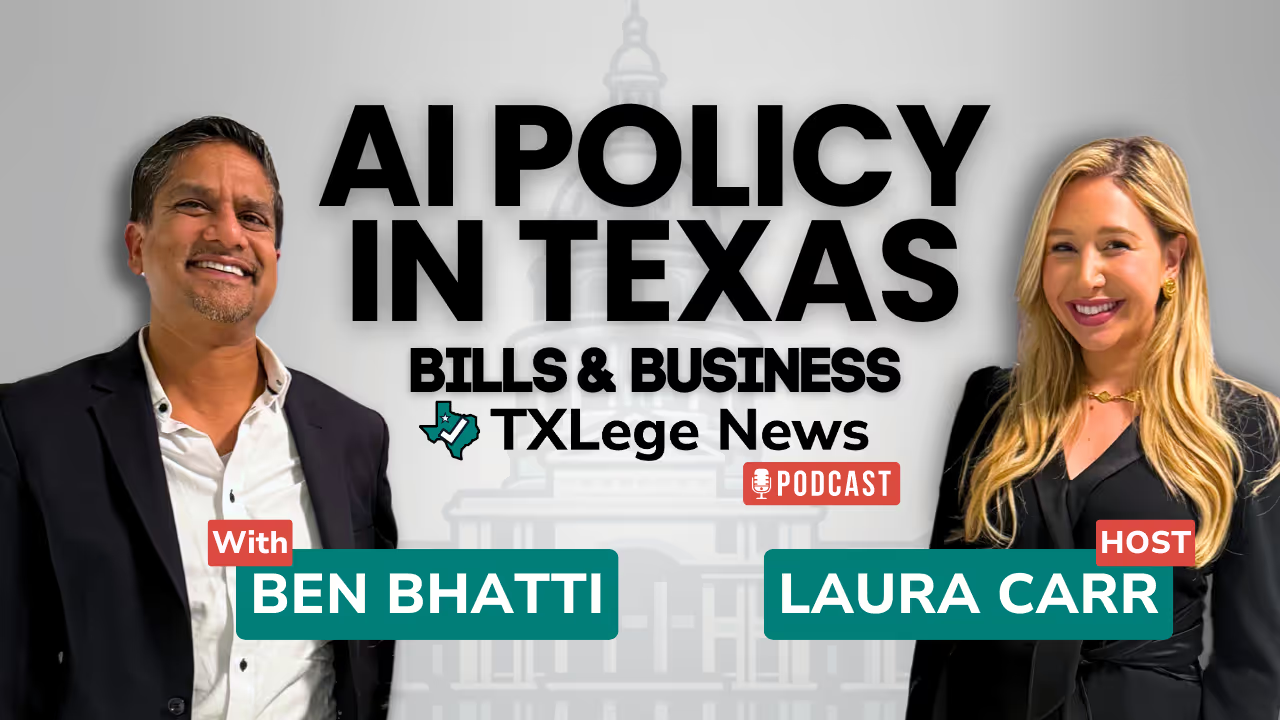
#9 - Ben Bhatti: A New Frontier: Texas Leading the Way on AI Policy for Smart Growth and Resilience
Welcome to Episode #9 of Bills & Business: Texas Legislative News! In this episode, host Laura Carr is joined by Ben Bhatti, J.D., the President, CEO, and Founder of the Texas AI Association. Ben’s impressive career spans education, public service, and technology leadership, making him a key advocate for advancing AI innovation and policy in Texas.
Together, they discuss how Texas’s unique culture of resilience and bold innovation positions it as a leader in AI development. Ben dives into the Texas AI Association’s flagship initiatives, including an AI-driven tax incentive program and the concept of a Texas Stock Exchange for AI efficiencies. He also tackles common misconceptions about AI, its ethical implications, and the steps Texas leaders can take to ensure responsible and inclusive AI adoption.
Join Laura and Ben for an insightful conversation about the future of AI in Texas and its potential to revolutionize industries such as energy, healthcare, and finance.
Don’t forget to subscribe to Bills & Business on Apple Podcasts, Spotify, and YouTube for more in-depth discussions on the key issues shaping Texas.
📲 Follow Laura Carr
🐦 Twitter: @Laura_USLege https://x.com/Laura_USLege
💼 LinkedIn: https://www.linkedin.com/in/laurauslege/
📸 Instagram: https://www.instagram.com/thereallauracarr/
🛍️ ShopMy: https://shopmy.us/shop/lauraluise?Section_title=latest-finds&tab=collections
✍️ Substack: https://lauraluise.substack.com/
🔗 Links: https://lauraluise.carrd.co/
📲 Follow USLege
✨ Instagram: https://www.instagram.com/uslege.ai/
📘 Facebook: https://www.facebook.com/USLegeai
🐦 Twitter: @USLege_ai https://x.com/USLege_ai
💼 LinkedIn: https://www.linkedin.com/company/uslege-ai/
🎧 Subscribe to Bills & Business
🌐 Website: https://www.uslege.ai/
▶️ YouTube: https://www.youtube.com/@BillsandBusiness
🎵 Spotify: https://open.spotify.com/show/22ZWg9VVb2AEGqyV14osNi?si=effe3795f8414171
🍎 Apple Podcasts: https://podcasts.apple.com/ph/podcast/bills-and-business-by-uslege/id1781059329
🎥 TikTok: https://www.tiktok.com/@billsandbusiness
🎬 Produced by USLege
📞 Want to see USLege in action? Schedule a demo today! https://www.uslege.ai/demo

#8 - Glenn Hamer: Hamer Time
Welcome to Episode #8 of Bills & Business: TXLege News! In this episode, Laura Carr, Co-Founder of USLege, sits down with Glenn Hamer, President and CEO of the Texas Association of Business (TAB), to explore how pro-business policies and trade relationships are shaping the future of Texas’ economy.
Glenn shares his insights on the challenges and opportunities Texas businesses face under the newly re-elected administration of President Trump, including the proposed tariffs on Mexican, Canadian, and Chinese goods, and their potential impacts on local industries. With his extensive experience in fostering business connections and advocating for economic growth, Glenn delves into critical topics like the future of USMCA, the role of trade policy in addressing immigration, and how Texas can maintain its position as a pro-business leader.
Don’t miss this engaging conversation on the legislative and economic priorities that matter most to Texas businesses. Be sure to subscribe to Bills & Business on Apple Podcasts, Spotify, and YouTube for more expert insights and updates!
📲 Follow Laura Carr
🐦 Twitter: @Laura_USLege https://x.com/Laura_USLege
💼 LinkedIn: https://www.linkedin.com/in/laurauslege/
📸 Instagram: https://www.instagram.com/thereallauracarr/
🛍️ ShopMy: https://shopmy.us/shop/lauraluise?Section_title=latest-finds&tab=collections
✍️ Substack: https://lauraluise.substack.com/
🔗 Links: https://lauraluise.carrd.co/
📲 Follow USLege
✨ Instagram: https://www.instagram.com/uslege.ai/
📘 Facebook: https://www.facebook.com/USLegeai
🐦 Twitter: @USLege_ai https://x.com/USLege_ai
💼 LinkedIn: https://www.linkedin.com/company/uslege-ai/
🎧 Subscribe to Bills & Business
🌐 Website: https://www.uslege.ai/
▶️ YouTube: https://www.youtube.com/@BillsandBusiness
🎵 Spotify: https://open.spotify.com/show/22ZWg9VVb2AEGqyV14osNi?si=effe3795f8414171
🍎 Apple Podcasts: https://podcasts.apple.com/ph/podcast/bills-and-business-by-uslege/id1781059329
🎥 TikTok: https://www.tiktok.com/@billsandbusiness
🎬 Produced by USLege
📞 Want to see USLege in action? Schedule a demo today! https://www.uslege.ai/demo

#7 - Cristina Masters & Laura Stowe - Navigating Legislative Advocacy
In Episode #7 of Bills & Business: TXLege News, we delve into the world of legislative advocacy with two influential Texas Chiefs of Staff, Laura Stowe and Cristina Masters. This episode provides a rare behind-the-scenes look at the legislative process through the perspectives of these seasoned professionals.
Laura Stowe, Chief of Staff to Senator Angela Paxton of Senate District 8, shares her journey from state agency work to becoming a key figure in shaping policy and finance. Cristina Masters, Chief of Staff for State Representative Claudia Ordaz, brings her wealth of experience from the Austin City Council and her commitment to mentoring future leaders.
Together, they discuss what makes advocacy effective, how lobbyists can stand out amidst the flurry of bills, and the importance of building relationships before and during the session. They also dive into communication strategies, bipartisan collaboration, and the challenges and priorities for the upcoming legislative session.
This episode is packed with actionable insights for lobbyists, policymakers, and anyone passionate about Texas politics. Join us for this in-depth conversation that bridges the gap between policy and people.
Don’t forget to subscribe to Bills & Business on Apple Podcast, Spotify, and YouTube for more engaging discussions on the issues shaping Texas!
📲 Follow Laura Carr
🐦 Twitter: @Laura_USLege https://x.com/Laura_USLege
💼 LinkedIn: https://www.linkedin.com/in/laurauslege/
📸 Instagram: https://www.instagram.com/thereallauracarr/
🛍️ ShopMy: https://shopmy.us/shop/lauraluise?Section_title=latest-finds&tab=collections
✍️ Substack: https://lauraluise.substack.com/
🔗 Links: https://lauraluise.carrd.co/
📲 Follow USLege
✨ Instagram: https://www.instagram.com/uslege.ai/
📘 Facebook: https://www.facebook.com/USLegeai
🐦 Twitter: @USLege_ai https://x.com/USLege_ai
💼 LinkedIn: https://www.linkedin.com/company/uslege-ai/
🎧 Subscribe to Bills & Business
🌐 Website: https://www.uslege.ai/
▶️ YouTube: https://www.youtube.com/@BillsandBusiness
🎵 Spotify: https://open.spotify.com/show/22ZWg9VVb2AEGqyV14osNi?si=effe3795f8414171
🍎 Apple Podcasts: https://podcasts.apple.com/ph/podcast/bills-and-business-by-uslege/id1781059329
🎥 TikTok: https://www.tiktok.com/@billsandbusiness
🎬 Produced by USLege
📞 Want to see USLege in action? Schedule a demo today! https://www.uslege.ai/demo
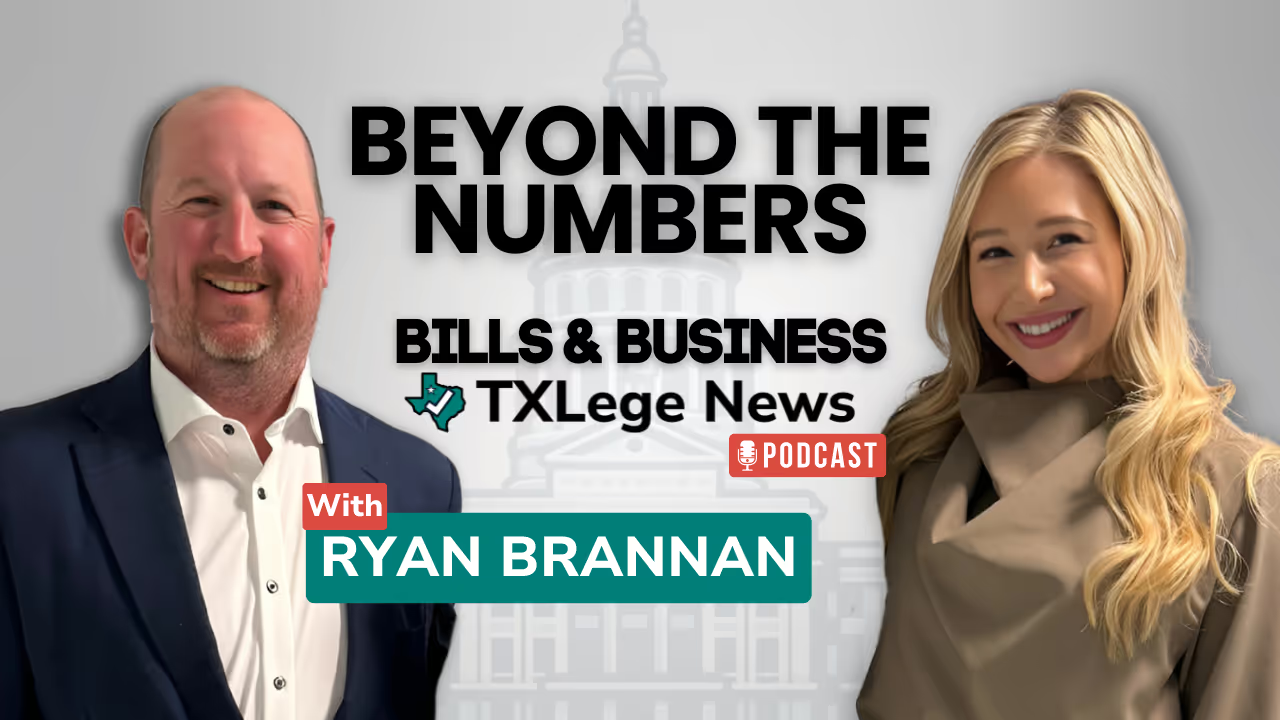
#6 - Ryan Brannan: Beyond the Numbers: Texas Budget and Advocacy Strategies
Welcome to Episode #6 of Bills & Business: TXLege News! In this episode, Laura Carr sits down with Ryan Brannan, founder and principal of The Brannan Firm and a top-ranking Texas lobbyist. With extensive experience under Governors Greg Abbott and Rick Perry, Ryan provides unique insights into the challenges and opportunities this legislative session presents.
Ryan discusses Texas’ significant budget surplus and how it could transform state priorities. From a $50 million investment in the Port of Galveston to innovative Medicaid fraud prevention strategies and school funding reform, he offers a behind-the-scenes look at the decisions shaping Texas’ future.
Discover how new legislators and a shift to the right could influence spending and government reform, the importance of smart, one-time investments to safeguard against leaner years, and how to balance economic growth with sound public policy.
Join Laura Carr and Ryan Brannan as they unpack the legislative and business strategies that will impact Texas for years to come.
Don’t forget to subscribe to Bills & Business on YouTube and Spotify to stay updated on key Texas legislative issues!
📲 Follow Laura Carr
🐦 Twitter: @Laura_USLege https://x.com/Laura_USLege
💼 LinkedIn: https://www.linkedin.com/in/laurauslege/
📸 Instagram: https://www.instagram.com/thereallauracarr/
🛍️ ShopMy: https://shopmy.us/shop/lauraluise?Section_title=latest-finds&tab=collections
✍️ Substack: https://lauraluise.substack.com/
🔗 Links: https://lauraluise.carrd.co/
📲 Follow USLege
✨ Instagram: https://www.instagram.com/uslege.ai/
📘 Facebook: https://www.facebook.com/USLegeai
🐦 Twitter: @USLege_ai https://x.com/USLege_ai
💼 LinkedIn: https://www.linkedin.com/company/uslege-ai/
🎧 Subscribe to Bills & Business
🌐 Website: https://www.uslege.ai/
▶️ YouTube: https://www.youtube.com/@BillsandBusiness
🎵 Spotify: https://open.spotify.com/show/22ZWg9VVb2AEGqyV14osNi?si=effe3795f8414171
🍎 Apple Podcasts: https://podcasts.apple.com/ph/podcast/bills-and-business-by-uslege/id1781059329
🎥 TikTok: https://www.tiktok.com/@billsandbusiness
🎬 Produced by USLege
📞 Want to see USLege in action? Schedule a demo today! https://www.uslege.ai/demo
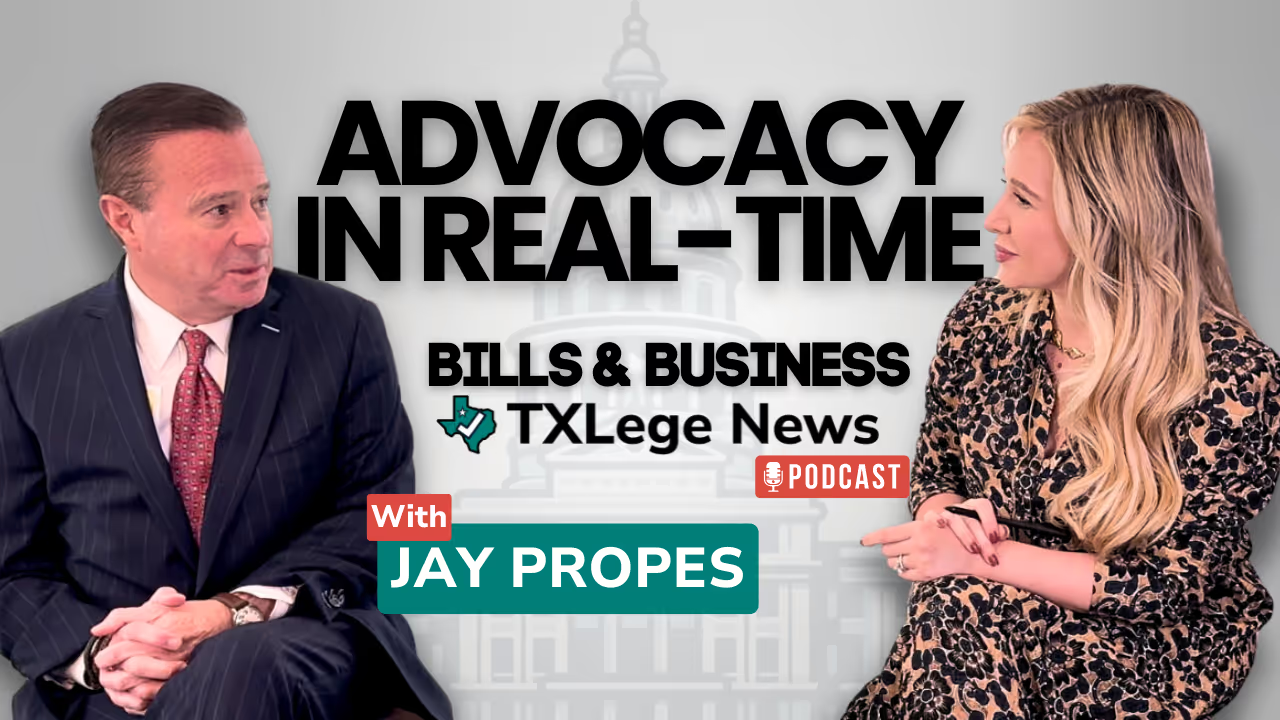
#5 - Jay Propes: Advocacy in Real-Time & The Future of Politics
Welcome to Episode #5 of Bills & Business: TXLege News! Join us as we explore how real-time information is revolutionizing advocacy with Jay Propes, Partner at Mercury Public Affairs. With over 30 years of experience in government relations and public affairs, Jay shares his unique insights into the evolving demands of advocacy work and how technology, especially AI, is transforming the landscape.
In this episode, Jay and host Laura Carr discuss:
How the demand for instant updates is reshaping advocacy strategies.
The role of AI in legislative tracking, predictive analytics, and stakeholder communication.
The challenges of managing real-time information flow while maintaining accuracy.
Predictions for the next decade of advocacy and how professionals can stay ahead of the curve.
Whether you're a business leader, policymaker, or advocacy professional, this episode offers a fascinating look at the intersection of technology, legislation, and public affairs.
Don’t forget to subscribe to Bills & Business on Spotify and YouTube for more in-depth conversations on the key issues shaping Texas and beyond!
📲 Follow Laura Carr
🐦 Twitter: @Laura_USLege https://x.com/Laura_USLege
💼 LinkedIn: https://www.linkedin.com/in/laurauslege/
📸 Instagram: https://www.instagram.com/thereallauracarr/
🛍️ ShopMy: https://shopmy.us/shop/lauraluise?Section_title=latest-finds&tab=collections
✍️ Substack: https://lauraluise.substack.com/
🔗 Links: https://lauraluise.carrd.co/
📲 Follow USLege
✨ Instagram: https://www.instagram.com/uslege.ai/
📘 Facebook: https://www.facebook.com/USLegeai
🐦 Twitter: @USLege_ai https://x.com/USLege_ai
💼 LinkedIn: https://www.linkedin.com/company/uslege-ai/
🎧 Subscribe to Bills & Business
🌐 Website: https://www.uslege.ai/
▶️ YouTube: https://www.youtube.com/@BillsandBusiness
🎵 Spotify: https://open.spotify.com/show/22ZWg9VVb2AEGqyV14osNi?si=effe3795f8414171
🍎 Apple Podcasts: https://podcasts.apple.com/ph/podcast/bills-and-business-by-uslege/id1781059329
🎥 TikTok: https://www.tiktok.com/@billsandbusiness
🎬 Produced by USLege
📞 Want to see USLege in action? Schedule a demo today! https://www.uslege.ai/demo
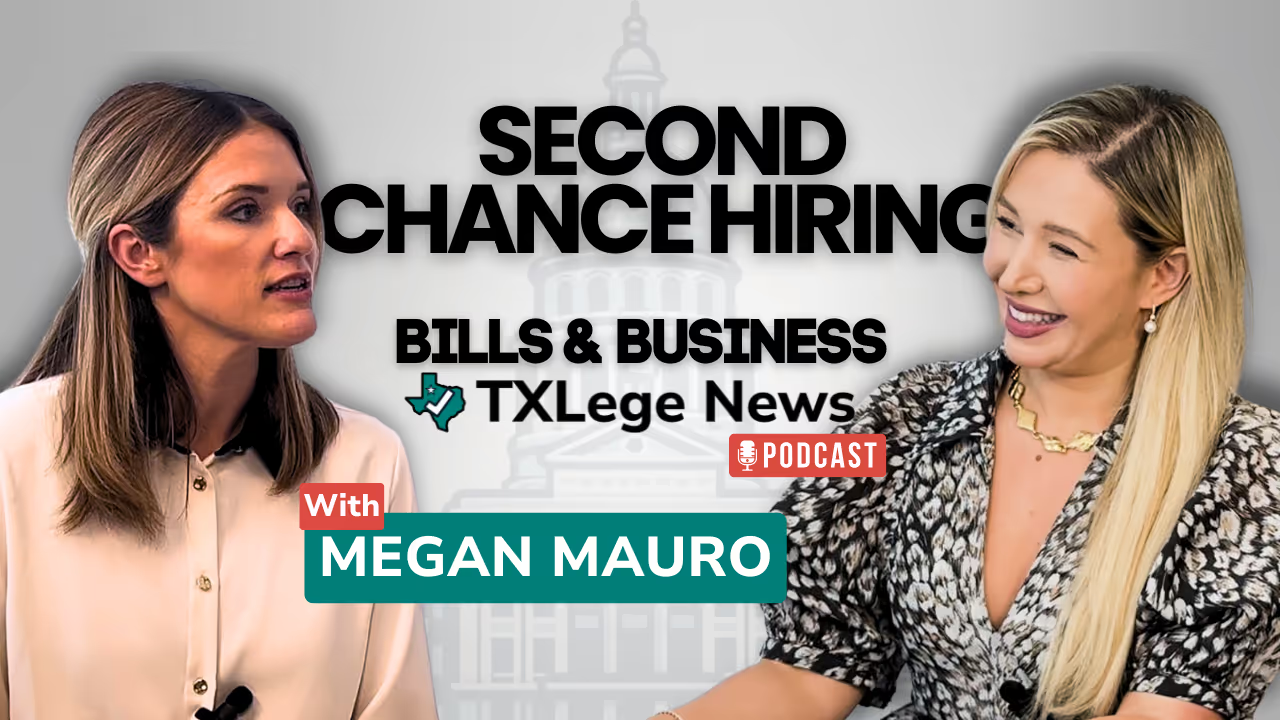
#4 - Megan Mauro: Second Chance Hiring & Unlocking Talent for Texas Businesses
Welcome to Episode #4 of Bills & Business: TXLege News! In this episode, we explore second chance hiring with Megan Mauro, Executive Vice President of the Texas Association of Business. Megan discusses the Texas Second Chance Employers Coalition, an initiative launched by the TAB Foundation to support hiring practices that empower individuals with criminal records to rejoin the workforce.
Join host Laura Carr, Co-Founder of USLege, as she and Megan dive into the benefits of second-chance hiring. They cover how these practices not only provide meaningful opportunities for individuals and families but also offer businesses a loyal and skilled talent pool. They’ll discuss the ways in which companies like JPMorgan Chase, Union Pacific, and Refined Technologies are leading the charge and setting an example in this important area.
Listen in to learn about the business case for second chance hiring and how it contributes to community growth, workforce development, and economic resilience.
Don’t forget to subscribe to Bills & Business on Spotify and YouTube for more conversations on the key issues shaping Texas.
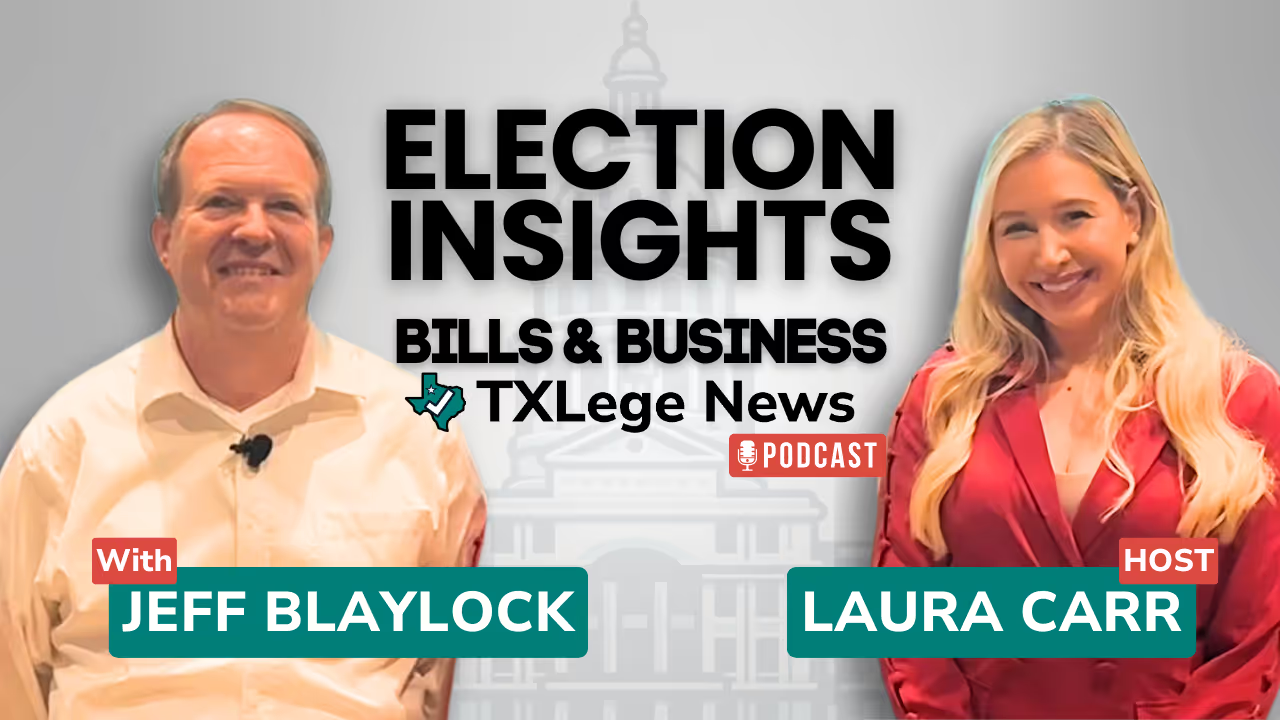
#2 - Jeff Blaylock: Unpacking The Texas Elections
In this episode of Bills & Business: Texas Legislative News, host Laura Carr sits down with Texas political expert Jeff Blaylock, Founder of TXElects Legacy and Senior News Editor at TXLege, to dive into the key issues shaping Texas elections.
Jeff shares insights on the historical statewide winning streak of Texas Republicans, key challenges faced by Texas Democrats, and upcoming races that could reshape the state's political landscape. Whether you're a policy professional or a political enthusiast, this conversation is filled with valuable perspectives on the future of Texas politics.
Don’t forget to subscribe to Bills & Business on Spotify and YouTube for more expert conversations on the key legislative and business issues affecting Texas.
📲 Follow Laura Carr
🐦 Twitter: @Laura_USLege https://x.com/Laura_USLege
💼 LinkedIn: https://www.linkedin.com/in/laurauslege/
📸 Instagram: https://www.instagram.com/thereallauracarr/
🛍️ ShopMy: https://shopmy.us/shop/lauraluise?Section_title=latest-finds&tab=collections
✍️ Substack: https://lauraluise.substack.com/
🔗 Links: https://lauraluise.carrd.co/
📲 Follow USLege
✨ Instagram: https://www.instagram.com/uslege.ai/
📘 Facebook: https://www.facebook.com/USLegeai
🐦 Twitter: @USLege_ai https://x.com/USLege_ai
💼 LinkedIn: https://www.linkedin.com/company/uslege-ai/
🎧 Subscribe to Bills & Business
🌐 Website: https://www.uslege.ai/
▶️ YouTube: https://www.youtube.com/@BillsandBusiness
🎵 Spotify: https://open.spotify.com/show/22ZWg9VVb2AEGqyV14osNi?si=effe3795f8414171
🍎 Apple Podcasts: https://podcasts.apple.com/ph/podcast/bills-and-business-by-uslege/id1781059329
🎥 TikTok: https://www.tiktok.com/@billsandbusiness
🎬 Produced by USLege
📞 Want to see USLege in action? Schedule a demo today! https://www.uslege.ai/demo
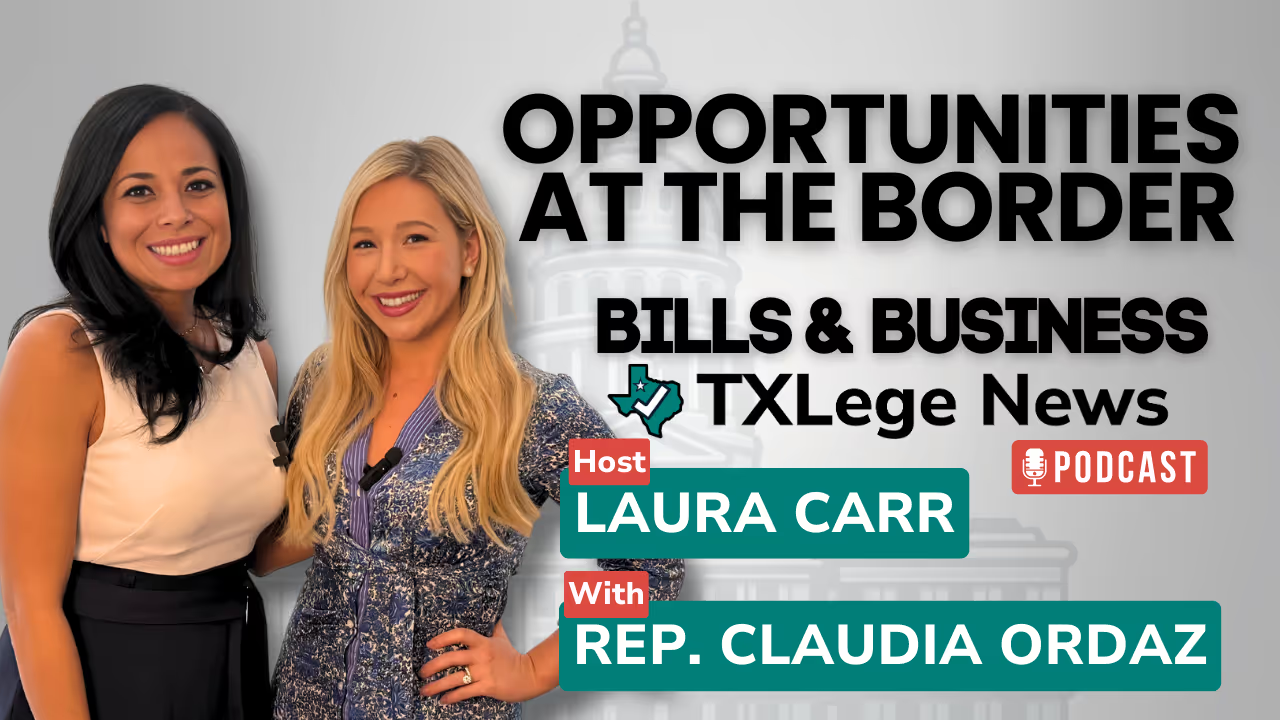
#3 - Rep. Claudia Ordaz: Advancing Texas Infrastructure & Community Empowerment
Welcome to Episode #3 of Bills & Business: TXLege News! In this episode, we’re joined by Claudia Ordaz, Texas State Representative and advocate for infrastructure development and community-focused policies in Texas. Claudia dives into the critical issues facing Texas communities, from expanding infrastructure to supporting economic empowerment for families and local businesses.
Ordaz shares her perspective on the legislative steps needed to support sustainable growth, improve transportation, and foster economic resilience across Texas. Join Laura Carr, Co-Founder of USLege, for a dynamic conversation about the legislative and business priorities that are shaping Texas today and tomorrow.
Don’t forget to subscribe to Bills & Business on Spotify and YouTube for more in-depth conversations on the key issues impacting Texas.
📲 Follow Laura Carr
🐦 Twitter: @Laura_USLege https://x.com/Laura_USLege
💼 LinkedIn: https://www.linkedin.com/in/laurauslege/
📸 Instagram: https://www.instagram.com/thereallauracarr/
🛍️ ShopMy: https://shopmy.us/shop/lauraluise?Section_title=latest-finds&tab=collections
✍️ Substack: https://lauraluise.substack.com/
🔗 Links: https://lauraluise.carrd.co/
📲 Follow USLege
✨ Instagram: https://www.instagram.com/uslege.ai/
📘 Facebook: https://www.facebook.com/USLegeai
🐦 Twitter: @USLege_ai https://x.com/USLege_ai
💼 LinkedIn: https://www.linkedin.com/company/uslege-ai/
🎧 Subscribe to Bills & Business
🌐 Website: https://www.uslege.ai/
▶️ YouTube: https://www.youtube.com/@BillsandBusiness
🎵 Spotify: https://open.spotify.com/show/22ZWg9VVb2AEGqyV14osNi?si=effe3795f8414171
🍎 Apple Podcasts: https://podcasts.apple.com/ph/podcast/bills-and-business-by-uslege/id1781059329
🎥 TikTok: https://www.tiktok.com/@billsandbusiness
🎬 Produced by USLege
📞 Want to see USLege in action? Schedule a demo today! https://www.uslege.ai/demo
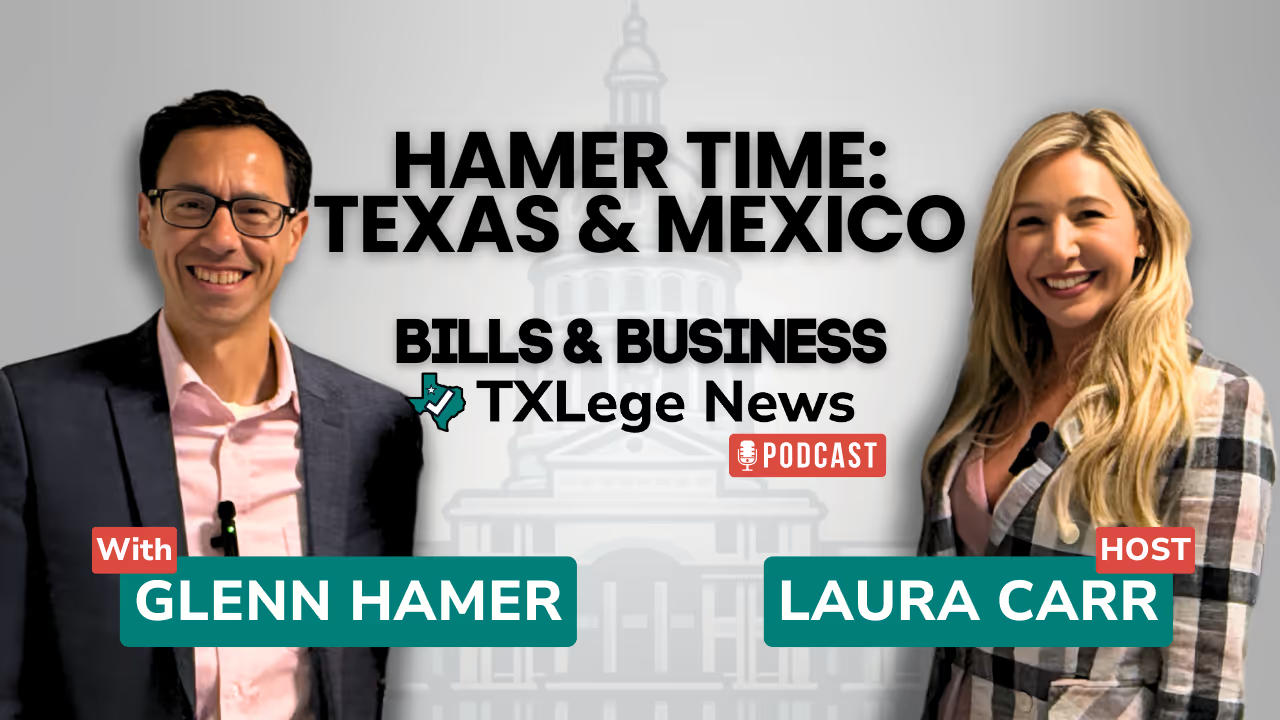
#1 - Glenn Hamer: Workforce Development & Infrastructure in Texas-Mexico
Welcome to the very first episode of Bills & Business: TXLege News! We’re kicking off with a special guest, Glenn Hamer, President & CEO of the Texas Association of Business (TAB), as part of our Hammer Time series.
In this inaugural episode, Glenn shares his insights on the evolving relationship between Texas and Mexico, following the historic inauguration of Mexico’s first female president, Dr. Claudia Sheinbaum. We dive into key opportunities for Texas businesses in workforce development and infrastructure, exploring how Texas can position itself as a leader in the new era of nearshoring and cross-border collaboration.
Join Laura Carr, Co-Founder of USLege, for an engaging conversation that’s packed with valuable takeaways for Texas business leaders navigating this important partnership.
Don’t forget to subscribe to Bills & Business on Spotify and YouTube for more expert conversations on the key legislative and business issues affecting Texas.
📲 Follow Laura Carr
🐦 Twitter: @Laura_USLege https://x.com/Laura_USLege
💼 LinkedIn: https://www.linkedin.com/in/laurauslege/
📸 Instagram: https://www.instagram.com/thereallauracarr/
🛍️ ShopMy: https://shopmy.us/shop/lauraluise?Section_title=latest-finds&tab=collections
✍️ Substack: https://lauraluise.substack.com/
🔗 Links: https://lauraluise.carrd.co/
📲 Follow USLege
✨ Instagram: https://www.instagram.com/uslege.ai/
📘 Facebook: https://www.facebook.com/USLegeai
🐦 Twitter: @USLege_ai https://x.com/USLege_ai
💼 LinkedIn: https://www.linkedin.com/company/uslege-ai/
🎧 Subscribe to Bills & Business
🌐 Website: https://www.uslege.ai/
▶️ YouTube: https://www.youtube.com/@BillsandBusiness
🎵 Spotify: https://open.spotify.com/show/22ZWg9VVb2AEGqyV14osNi?si=effe3795f8414171
🍎 Apple Podcasts: https://podcasts.apple.com/ph/podcast/bills-and-business-by-uslege/id1781059329
🎥 TikTok: https://www.tiktok.com/@billsandbusiness
🎬 Produced by USLege
📞 Want to see USLege in action? Schedule a demo today! https://www.uslege.ai/demo


